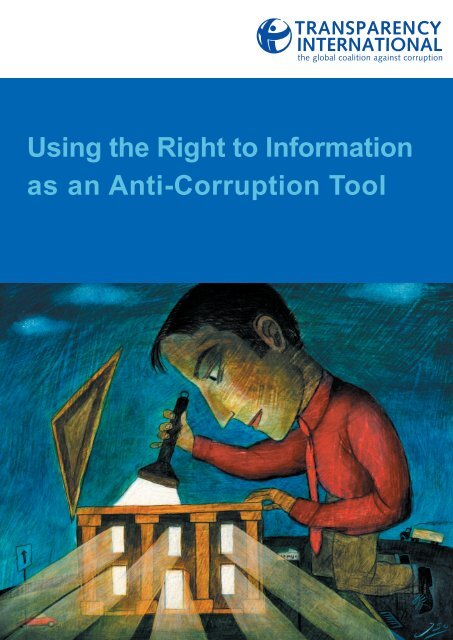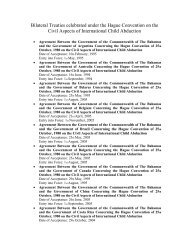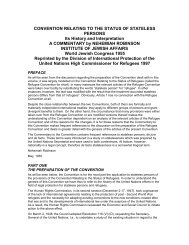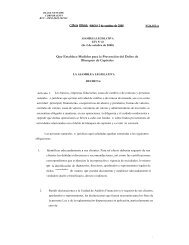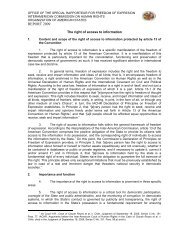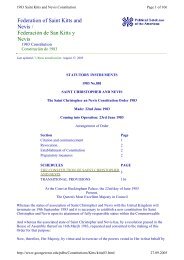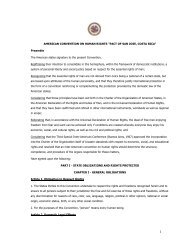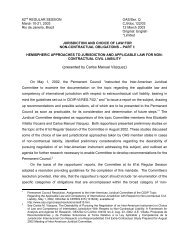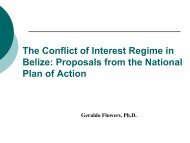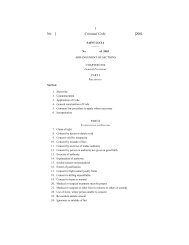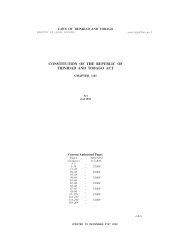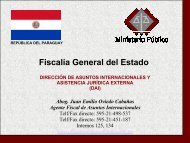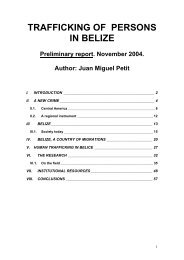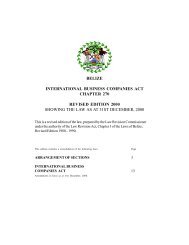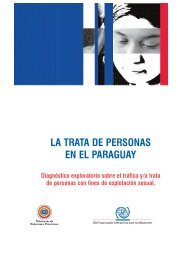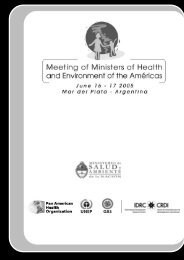Using the Right to Information as an Anti Corruption Tool.pdf - OAS
Using the Right to Information as an Anti Corruption Tool.pdf - OAS
Using the Right to Information as an Anti Corruption Tool.pdf - OAS
You also want an ePaper? Increase the reach of your titles
YUMPU automatically turns print PDFs into web optimized ePapers that Google loves.
TRANSPARENCY<br />
INTERNATIONAL<br />
<strong>Using</strong> <strong>the</strong> <strong>Right</strong> <strong>to</strong> <strong>Information</strong><br />
<strong>as</strong> <strong>an</strong> <strong>Anti</strong>-<strong>Corruption</strong> <strong>Tool</strong>
www.tr<strong>an</strong>sparency.org<br />
Your gateway <strong>to</strong> <strong>the</strong> fi ght against corruption<br />
<strong>Using</strong> <strong>the</strong> <strong>Right</strong> <strong>to</strong> <strong>Information</strong><br />
<strong>as</strong> <strong>an</strong> <strong>Anti</strong>-<strong>Corruption</strong> <strong>Tool</strong><br />
Published by Tr<strong>an</strong>sparency International<br />
Edited by Nurh<strong>an</strong> Kocaoglu <strong>an</strong>d Andrea Figari (TI-S),<br />
Helen Darbishire (Executive Direc<strong>to</strong>r of Access Info)<br />
Designed by Georg Neum<strong>an</strong>n<br />
Pho<strong>to</strong> cover: Courtesy of Corbis, Inc.<br />
ISBN: 3-935711-20-4<br />
Acknowledgements<br />
M<strong>an</strong>y different people have been involved in helping produce this publication.<br />
Tr<strong>an</strong>sparency International th<strong>an</strong>ks <strong>the</strong>m all:<br />
Issa Luna Pla from <strong>the</strong> Freedom of <strong>Information</strong> Network – Mexico; Javier<br />
C<strong>as</strong><strong>as</strong> from <strong>the</strong> Press <strong>an</strong>d Society Institute in Peru; Aleks<strong>an</strong>dra Martinovic,<br />
Executive Direc<strong>to</strong>r of TI Bosnia & Herzegovina; Nem<strong>an</strong>ja Nenadic, Executive<br />
Direc<strong>to</strong>r of TI Serbia; Violeta Liovic, Executive Direc<strong>to</strong>r of TI Croatia<br />
<strong>an</strong>d Ca<strong>the</strong>rine Woollard, Georg Neum<strong>an</strong>n, Gilli<strong>an</strong> Dell, Jennifer Williams,<br />
JoAnna Pollonais <strong>an</strong>d Kate Sturgess from <strong>the</strong> Tr<strong>an</strong>sparency International<br />
Secretariat in Berlin.<br />
Full support for this publication w<strong>as</strong> provided by <strong>the</strong> OPEN SOCIETY INSTITUTE.
USING THE RIGHT TO INFORMATION AS AN ANTI-CORRUPTION TOOL<br />
PREFACE<br />
A crucial question for <strong>an</strong>ti-corruption activists is whe<strong>the</strong>r<br />
<strong>the</strong> r<strong>as</strong>h of new access <strong>to</strong> information laws – over 50 laws<br />
adopted since 1990 bringing <strong>the</strong> <strong>to</strong>tal <strong>to</strong> over 65 laws globally 1<br />
– will serve <strong>as</strong> <strong>to</strong>ols for obtaining information of use in fighting<br />
corruption. Or will <strong>the</strong>se new tr<strong>an</strong>sparency laws at le<strong>as</strong>t<br />
narrow <strong>the</strong> r<strong>an</strong>ge of opportunities for <strong>the</strong> mism<strong>an</strong>agement<br />
<strong>an</strong>d diversion of public funds by permitting public scrutiny of<br />
<strong>the</strong> budgets <strong>an</strong>d administrative decision-making?<br />
The question c<strong>an</strong>not yet be fully <strong>an</strong>swered, but <strong>the</strong> lessons<br />
learned by Tr<strong>an</strong>sparency International Chapters <strong>an</strong>d o<strong>the</strong>r<br />
civil society org<strong>an</strong>izations in South E<strong>as</strong>t Europe <strong>an</strong>d around<br />
<strong>the</strong> globe provide helpful pointers <strong>as</strong> <strong>to</strong> how <strong>to</strong> ensure that<br />
<strong>the</strong> fine provisions of a new access <strong>to</strong> information law are<br />
tr<strong>an</strong>slated from <strong>the</strong> pages of <strong>the</strong> statute books <strong>to</strong> me<strong>an</strong>ingful<br />
information in <strong>the</strong> h<strong>an</strong>ds of members of <strong>the</strong> public.<br />
It may seem self-evident that <strong>the</strong>re needs <strong>to</strong> be a dem<strong>an</strong>d for<br />
information if a new access <strong>to</strong> information law is <strong>to</strong> function,<br />
but in a number of countries it h<strong>as</strong> taken time <strong>to</strong> realize<br />
quite how crucial this is. In countries where <strong>the</strong> law is good<br />
on paper but h<strong>as</strong> been introduced <strong>as</strong> part of a <strong>to</strong>p-down<br />
government reform pl<strong>an</strong> (Alb<strong>an</strong>ia), international initiative<br />
(Bosnia 2<br />
), or lobbying from a civil society elite (Peru) implementation<br />
h<strong>as</strong> proved slow.<br />
By contr<strong>as</strong>t in counties such <strong>as</strong> Rom<strong>an</strong>ia <strong>an</strong>d Bulgaria,<br />
where broad-b<strong>as</strong>ed coalitions pressed for access laws, <strong>the</strong><br />
less-th<strong>an</strong>-perfect statutes were <strong>the</strong>n hungrily used by civil<br />
society, journalists, <strong>an</strong>d members of <strong>the</strong> general public alike.<br />
Moni<strong>to</strong>ring in Bulgaria <strong>an</strong>d Rom<strong>an</strong>ia show that over 50%<br />
of requests filed receive <strong>the</strong> information sought 3 , which, for<br />
countries that relatively recently were closed <strong>an</strong>d repressive<br />
communist systems <strong>an</strong>d where maladministration <strong>an</strong>d corruptions<br />
are still serious problems, is a very signific<strong>an</strong>t level<br />
of disclosure.<br />
The lesson is that a culture of openness information needs<br />
<strong>to</strong> learned, <strong>an</strong>d this only happens when public bodies receive<br />
large numbers or requests <strong>an</strong>d are challenged when information<br />
is not rele<strong>as</strong>ed. This lesson h<strong>as</strong> been taken <strong>to</strong> heart by<br />
groups in countries such <strong>as</strong> Serbia, Croatia, <strong>an</strong>d Macedonia,<br />
who started testing <strong>an</strong>d moni<strong>to</strong>ring <strong>as</strong> soon <strong>as</strong> <strong>the</strong> new laws<br />
came in<strong>to</strong> force.<br />
Moni<strong>to</strong>ring studies have confirmed <strong>an</strong>o<strong>the</strong>r self-evident<br />
truth: it is e<strong>as</strong>ier <strong>to</strong> obtain more routine information th<strong>an</strong><br />
<strong>to</strong> get <strong>an</strong>swers <strong>to</strong> complex or sensitive requests 4 . The strategy<br />
for <strong>an</strong>ti-corruption activists aiming <strong>to</strong> erode <strong>the</strong> walls of<br />
government secrecy must be <strong>to</strong> file requests for non-controversial<br />
data in order gradually <strong>to</strong> build <strong>the</strong> edifice of tr<strong>an</strong>sparent<br />
government.<br />
Training of Public Officials<br />
A common <strong>as</strong>sumption when a request for information is<br />
not <strong>an</strong>swered is that this results from deliberate secrecy by<br />
public officials. Such a conclusion is not surprising in countries<br />
that until recently were repressive dicta<strong>to</strong>rships. Even in<br />
more developed democracies <strong>the</strong> paternalistic <strong>an</strong>d secretive<br />
attitudes of public administrations give good cause <strong>to</strong> doubt<br />
<strong>the</strong> political will <strong>to</strong> openness.<br />
As <strong>the</strong> reports in this publication show, however, a number<br />
of fac<strong>to</strong>rs o<strong>the</strong>r th<strong>an</strong> political will c<strong>an</strong> block openness. These<br />
fac<strong>to</strong>rs include lack of training of public officials when a<br />
new law comes in<strong>to</strong> force (Bosnia), non-appointment of<br />
information officers (Croatia), <strong>an</strong>d poor information m<strong>an</strong>agement<br />
leading <strong>to</strong> problems responding within timeframes<br />
(Serbia). Traditional civil society strategies of condemning<br />
failures of government c<strong>an</strong> have <strong>an</strong> impact on political attitudes<br />
but may not address <strong>the</strong>se underlying problems.<br />
An alternative strategy is <strong>to</strong> work with government departments<br />
<strong>to</strong> train information officers <strong>an</strong>d help improve information<br />
m<strong>an</strong>agement systems. TI Bosnia h<strong>as</strong> conducted<br />
trainings for public officials <strong>as</strong> h<strong>as</strong> <strong>the</strong> Access <strong>to</strong> <strong>Information</strong><br />
Office (OACI) of <strong>the</strong> org<strong>an</strong>ization IPYS in Peru. OACI<br />
h<strong>as</strong> also worked with public officials <strong>to</strong> carry out internal<br />
diagnostics of information flows <strong>an</strong>d <strong>to</strong> make recommendations<br />
for improving information m<strong>an</strong>agement, in order <strong>to</strong> be<br />
able <strong>to</strong> respond <strong>to</strong> requests within <strong>the</strong> seven days allocated<br />
under Peruvi<strong>an</strong> law. These projects have had a positive impact,<br />
resulting in a qu<strong>an</strong>titative incre<strong>as</strong>e in information made<br />
available.<br />
As described in this publication, OACI provided technical<br />
<strong>as</strong>sist<strong>an</strong>ce <strong>to</strong> <strong>the</strong> Ministry of Health while still litigating<br />
against it <strong>to</strong> challenge refusals <strong>to</strong> rele<strong>as</strong>e information. The<br />
Ministry w<strong>as</strong> made fully aware of this <strong>an</strong>d actually welcomed<br />
<strong>the</strong> dual approach <strong>as</strong> being necessary <strong>to</strong> <strong>the</strong> reform process.<br />
Not all government bodies would be so receptive <strong>to</strong> such a<br />
strategy – <strong>the</strong> appropriate mix of collaboration <strong>an</strong>d confrontation<br />
h<strong>as</strong> <strong>to</strong> be selected on a c<strong>as</strong>e-by-c<strong>as</strong>e b<strong>as</strong>is – but it is<br />
clear that a r<strong>an</strong>ge of approaches are available <strong>to</strong> those working<br />
on implementing access <strong>to</strong> information laws.<br />
Where <strong>to</strong> turn when information is denied?<br />
The right <strong>to</strong> appeal <strong>an</strong> administrative decision is guar<strong>an</strong>teed<br />
in m<strong>an</strong>y counties; it is usually established in administrative<br />
law <strong>an</strong>d reiterated in most access <strong>to</strong> information laws. The<br />
role of <strong>the</strong> courts h<strong>as</strong> been key: from <strong>the</strong> phenomenal body<br />
of jurisprudence developed since <strong>the</strong> US FOIA w<strong>as</strong> adopted<br />
in 1966, <strong>to</strong> <strong>the</strong> 140 plus c<strong>as</strong>es brought in Bulgaria by <strong>the</strong> Access<br />
<strong>to</strong> <strong>Information</strong> Program since 2000 that have resulted<br />
in rele<strong>as</strong>e of information subsequently p<strong>as</strong>sed <strong>to</strong> <strong>the</strong> prosecu<strong>to</strong>r<br />
because it indicated government wrongdoing.<br />
Suing <strong>the</strong> government is a controversial strategy for m<strong>an</strong>y<br />
TRANSPARENCY INTERNATIONAL 2006 3
USING THE RIGHT TO INFORMATION AS AN ANTI-CORRUPTION TOOL<br />
CSOs unused <strong>to</strong> engaging in lengthy battles on one particular<br />
c<strong>as</strong>e. As discussed in this publication, some groups prefer<br />
<strong>to</strong> bring in specialist litiga<strong>to</strong>rs. Sometimes this necessitates<br />
resubmitting a request so that a new plaintiff c<strong>an</strong> initiate legal<br />
action. This h<strong>as</strong> been done in Peru by IPYS, one of <strong>the</strong><br />
constituent members of Proética (<strong>the</strong> Peruvi<strong>an</strong> TI chapter),<br />
who <strong>to</strong>ok up <strong>the</strong> court action when government ministers<br />
refused <strong>to</strong> disclose <strong>the</strong>ir <strong>as</strong>sets declarations. O<strong>the</strong>r groups<br />
with strong litigation experience, such <strong>as</strong> <strong>the</strong> Access <strong>to</strong> <strong>Information</strong><br />
Programme in Bulgaria <strong>an</strong>d <strong>the</strong> Rom<strong>an</strong>i<strong>an</strong> Helsinki<br />
Committee, have developed multi-faceted strategies,<br />
encouraging o<strong>the</strong>rs <strong>to</strong> file more winnable access <strong>to</strong> information<br />
suits but taking <strong>the</strong> <strong>to</strong>ugher c<strong>as</strong>es <strong>the</strong>mselves: if <strong>the</strong>y<br />
win, <strong>the</strong>y ensure that <strong>the</strong> jurisprudence is publicized; if <strong>the</strong>y<br />
lose, <strong>the</strong>y c<strong>an</strong> react with a new strategy (media rele<strong>as</strong>es, new<br />
requests, more litigation) <strong>to</strong> minimize damage <strong>to</strong> <strong>the</strong> right <strong>to</strong><br />
information.<br />
A preferable option, where it exists, is <strong>to</strong> turn <strong>to</strong> <strong>Information</strong><br />
Commissioners or Ombudsperson institutions. <strong>Information</strong><br />
Commissioners provide a sort of “litigation light”:<br />
less controversial th<strong>an</strong> traditional law suits, <strong>the</strong> option is often<br />
f<strong>as</strong>ter, cheaper <strong>an</strong>d e<strong>as</strong>ier (usually no lawyer is needed).<br />
Unfortunately, only about 25-30% of access <strong>to</strong> information<br />
laws worldwide establish such a body. Those that do, have<br />
proved <strong>to</strong> be worth <strong>the</strong>ir weight in gold. Hungary, whose<br />
1992 law w<strong>as</strong> <strong>the</strong> first in E<strong>as</strong>tern Europe, established a commissioner<br />
whose decisions do not have legally binding force<br />
but which are never<strong>the</strong>less often acted upon by government.<br />
More recently <strong>the</strong> Sloveni<strong>an</strong> <strong>Information</strong> Commissioner h<strong>as</strong><br />
been active in ruling that information such <strong>as</strong> government<br />
contracts must be made public: in one c<strong>as</strong>e <strong>the</strong> disputed<br />
contract w<strong>as</strong> between a local municipality <strong>an</strong>d a housing<br />
m<strong>an</strong>agement comp<strong>an</strong>y that w<strong>as</strong> run, <strong>as</strong> it happened, by <strong>the</strong><br />
deputy mayor 5 .<br />
Calling on Higher Powers: <strong>the</strong> Role of International Org<strong>an</strong>izations<br />
Supra-national org<strong>an</strong>izations have played <strong>an</strong> import<strong>an</strong>t role<br />
in promoting <strong>the</strong> adoption of access <strong>to</strong> information laws<br />
<strong>an</strong>d in setting st<strong>an</strong>dards for what <strong>the</strong>y should contain, notably<br />
through <strong>the</strong> Council of Europe Recommendation<br />
2002(2) on Access <strong>to</strong> Official Documents, which provides a<br />
framework for <strong>the</strong> content of tr<strong>an</strong>sparency laws.<br />
O<strong>the</strong>r international supervision mech<strong>an</strong>isms c<strong>an</strong> be used <strong>to</strong><br />
encourage full implementation of access laws. As outlined in<br />
this publication, <strong>the</strong> moni<strong>to</strong>ring mech<strong>an</strong>isms of <strong>the</strong> United<br />
Nations Convention Against <strong>Corruption</strong> <strong>an</strong>d <strong>the</strong> Council of<br />
Europe’s GRECO (Group of States Against <strong>Corruption</strong>)<br />
mech<strong>an</strong>ism provide such opportunities. Indeed, although <strong>the</strong><br />
Inter-Americ<strong>an</strong> Convention Against <strong>Corruption</strong> does not<br />
specifically mention <strong>the</strong> right <strong>to</strong> information, government<br />
tr<strong>an</strong>sparency is never<strong>the</strong>less one of <strong>the</strong> elements reviewed<br />
by its moni<strong>to</strong>ring mech<strong>an</strong>ism (MESICIC) that h<strong>as</strong> called on<br />
states <strong>to</strong> adopt laws where <strong>the</strong>y do not exist (Argentina, Uruguay)<br />
or <strong>to</strong> improve implementation (Peru, P<strong>an</strong>ama) 7 .<br />
Such mech<strong>an</strong>isms are limited but at le<strong>as</strong>t <strong>the</strong>y do exist. The<br />
onus is on civil society <strong>to</strong> exploit <strong>the</strong> myriad of <strong>to</strong>ols for<br />
ensuring that <strong>the</strong> access <strong>to</strong> information laws on <strong>the</strong> statutebooks<br />
become living <strong>an</strong>d functioning <strong>to</strong>ols in <strong>the</strong> h<strong>an</strong>ds of<br />
those working against corruption <strong>an</strong>d for hum<strong>an</strong> rights.<br />
by Helen Darbishire, Executive Direc<strong>to</strong>r, Access Info Europe<br />
1 For more information on <strong>the</strong> content of <strong>the</strong>se laws see, for example,<br />
www.freedominfo.org where <strong>the</strong> Global Survey by David B<strong>an</strong>isar of Pri-<br />
vacy International is presented country-by-country along with additional<br />
links <strong>an</strong>d data.<br />
2 The author of this article w<strong>as</strong> one of a group of international <strong>an</strong>d domestic<br />
experts convened by <strong>the</strong> OSCE <strong>to</strong> draft <strong>the</strong> Bosni<strong>an</strong> FOI law.<br />
3<br />
See “Tr<strong>an</strong>sparency <strong>an</strong>d Silence: A Survey of Access <strong>to</strong> <strong>Information</strong><br />
Laws <strong>an</strong>d Practices in Fourteen Countries”, Justice Initiative (2006),<br />
www.justiceinitiative.org.<br />
4 See “Tr<strong>an</strong>sparency <strong>an</strong>d Silence” ibid.<br />
5 Sloveni<strong>an</strong> <strong>Information</strong> Commissioner, C<strong>as</strong>e No. 020-18/2004/3, date<br />
28.10.2004, Applic<strong>an</strong>t against <strong>the</strong> conduct <strong>an</strong>d <strong>the</strong> decision of <strong>the</strong> Municipality<br />
of Radovljica.<br />
6 C<strong>as</strong>e of Claude Reyes et al vs. Chile, court ruling expected by early 2007.<br />
7 A full set of <strong>the</strong> MESICIC reports c<strong>an</strong> be found at http://www.o<strong>as</strong>.org/<br />
juridico/sp<strong>an</strong>ish/mec_ron1_inf.htm.<br />
The potential role of international org<strong>an</strong>izations does not<br />
s<strong>to</strong>p at adoption. The Council of Europe is converting <strong>the</strong><br />
2002 Recommendation in<strong>to</strong> a binding treaty that will include<br />
a moni<strong>to</strong>ring mech<strong>an</strong>ism. In <strong>the</strong> Americ<strong>as</strong>, access <strong>to</strong> information<br />
c<strong>as</strong>es before <strong>the</strong> Inter-Americ<strong>an</strong> Commission on<br />
Hum<strong>an</strong> <strong>Right</strong>s have resulted in strong support for <strong>the</strong> right<br />
<strong>to</strong> know, <strong>an</strong>d in April 2006 <strong>the</strong> Inter-Americ<strong>an</strong> Court heard<br />
a c<strong>as</strong>e which could result in <strong>the</strong> first ruling from <strong>an</strong> international<br />
tribunal affirming <strong>the</strong> fundamental right <strong>to</strong> government-held<br />
information 6 .<br />
4<br />
TRANSPARENCY INTERNATIONAL 2006
USING THE RIGHT TO INFORMATION AS AN ANTI-CORRUPTION TOOL<br />
In <strong>the</strong> p<strong>as</strong>t 15 years, along with tremendous political ch<strong>an</strong>ge, most<br />
countries in E<strong>as</strong>tern Europe have adopted laws that recognize <strong>the</strong><br />
right of citizens <strong>to</strong> access information held by <strong>the</strong> state, <strong>an</strong>d have<br />
establish processes by which <strong>the</strong> right c<strong>an</strong> be exercised. In m<strong>an</strong>y<br />
c<strong>as</strong>es greater government openness w<strong>as</strong> <strong>an</strong> expected reform<br />
within <strong>the</strong> framework of accession <strong>to</strong> <strong>the</strong> Europe<strong>an</strong> Union <strong>an</strong>d<br />
this combined with determined campaigns by civil society org<strong>an</strong>izations<br />
resulted in <strong>the</strong> p<strong>as</strong>sage of <strong>the</strong> new access laws.<br />
While democratic processes being res<strong>to</strong>red, <strong>the</strong>se laws are<br />
<strong>an</strong> attempt <strong>to</strong> bridge <strong>the</strong> imbal<strong>an</strong>ce between what <strong>the</strong> state<br />
knows <strong>an</strong>d what citizens know, <strong>an</strong>d provide <strong>an</strong> opportunity<br />
<strong>to</strong> break <strong>the</strong> culture of secrecy that h<strong>as</strong> dominated civic<br />
life in <strong>the</strong> region. This culture of secrecy h<strong>as</strong> favoured <strong>the</strong><br />
growth of deeply-rooted corrupt practices <strong>an</strong>d <strong>the</strong> newly<br />
recognized right <strong>to</strong> access public information h<strong>as</strong> <strong>the</strong>refore<br />
had <strong>to</strong> face serious challenges.<br />
In <strong>the</strong> next 15 years, <strong>the</strong> region will face m<strong>an</strong>y new challenges<br />
while corruption, unfortunately, will not disappear. The<br />
greater need <strong>to</strong> protect national security, <strong>the</strong> requirement <strong>to</strong><br />
guar<strong>an</strong>tee citizens´ privacy <strong>an</strong>d <strong>to</strong> recognition of <strong>the</strong> right <strong>to</strong><br />
access public information all seem <strong>to</strong> run in opposing directions.<br />
Striking <strong>the</strong> right bal<strong>an</strong>ce is a t<strong>as</strong>k that lies in <strong>the</strong> h<strong>an</strong>ds<br />
of governments, parliaments, <strong>the</strong> courts, <strong>an</strong>d civil society<br />
alike. The debate that <strong>the</strong>se questions will open should help<br />
clarify how <strong>to</strong> adapt <strong>to</strong> present circumst<strong>an</strong>ces <strong>an</strong>d at <strong>the</strong> same<br />
time guar<strong>an</strong>tee <strong>the</strong> respect of this right in<strong>to</strong> <strong>the</strong> future.<br />
On <strong>the</strong> positive side, <strong>the</strong> 2003 United Nations Convention<br />
Against <strong>Corruption</strong> (UNCAC) entered in<strong>to</strong> force in 2005<br />
<strong>an</strong>d its 140 signa<strong>to</strong>ries have committed <strong>to</strong> adopting access <strong>to</strong><br />
information regimes, <strong>as</strong> well <strong>as</strong> <strong>to</strong> implementing o<strong>the</strong>r tr<strong>an</strong>sparency<br />
me<strong>as</strong>ures in <strong>the</strong> conduct of state business. The Convention<br />
needs <strong>to</strong> be implemented <strong>an</strong>d moni<strong>to</strong>red <strong>to</strong> make sure<br />
it strikes a blow <strong>to</strong> corruption in all <strong>the</strong> are<strong>as</strong> it intends <strong>to</strong>, including<br />
<strong>the</strong> provisions on access <strong>to</strong> information, <strong>as</strong> those outlined<br />
in Article 10, for example. 1 Once again, it is crucial that<br />
civil society keeps this in <strong>the</strong> forefront of its advocacy work,<br />
<strong>as</strong> <strong>the</strong> implementation of UNCAC me<strong>as</strong>ures on access <strong>to</strong> information<br />
will surely provide a timely opportunity <strong>to</strong> bring <strong>to</strong><br />
<strong>the</strong> table <strong>the</strong> much needed ch<strong>an</strong>ges <strong>an</strong>d revisions <strong>to</strong> existing<br />
laws, which have been documented through <strong>the</strong> early ph<strong>as</strong>e of<br />
implementation in countries in South E<strong>as</strong>tern Europe.<br />
Greater outreach <strong>an</strong>d awareness raising is needed <strong>to</strong> inform<br />
<strong>the</strong> public not only about <strong>the</strong>ir right <strong>to</strong> access public information,<br />
but on <strong>the</strong> ways in which <strong>the</strong>y c<strong>an</strong> make effective<br />
use of this right. This h<strong>as</strong> a direct impact, for example, in<br />
gaining access <strong>to</strong> how <strong>the</strong> state distributes social benefits, or<br />
allocated funds for health <strong>an</strong>d/or education services, or how<br />
contracts are awarded in local or national procurement processes,<br />
<strong>to</strong> name just a few of <strong>the</strong> are<strong>as</strong> where corruption risks<br />
are high <strong>an</strong>d where greater access <strong>to</strong> information c<strong>an</strong> have a<br />
definite impact on people’s lives.<br />
I. Introduction: Linking <strong>the</strong> <strong>Right</strong> <strong>to</strong> <strong>Information</strong><br />
<strong>to</strong> <strong>Anti</strong>-<strong>Corruption</strong> work<br />
Access <strong>to</strong> information acts are grounded in <strong>the</strong> recognition<br />
“that information in <strong>the</strong> control of public authorities is a<br />
valuable public resource <strong>an</strong>d that public access <strong>to</strong> such information<br />
promotes greater tr<strong>an</strong>sparency <strong>an</strong>d accountability<br />
of those public authorities, <strong>an</strong>d that this information is essential<br />
<strong>to</strong> <strong>the</strong> democratic process”. 9 The purpose of <strong>the</strong>se<br />
acts, also known <strong>as</strong> access <strong>to</strong> information laws, is <strong>to</strong> make<br />
a government more open <strong>an</strong>d accountable <strong>to</strong> its people. In<br />
tr<strong>an</strong>sitional democracies, laws that give effect <strong>to</strong> <strong>the</strong> right <strong>to</strong><br />
information are part of <strong>the</strong> process of tr<strong>an</strong>sforming a country<br />
from one with a closed <strong>an</strong>d authoritari<strong>an</strong> government <strong>to</strong><br />
one governed by <strong>an</strong>d for <strong>the</strong> people.<br />
The right of citizens <strong>to</strong> know what governments, international<br />
org<strong>an</strong>izations <strong>an</strong>d private corporations are doing, <strong>an</strong>d<br />
how public resources are allocated, directly reflects <strong>an</strong>ti-corruption<br />
concerns. <strong>Corruption</strong> flourishes in darkness <strong>an</strong>d so<br />
<strong>an</strong>y progress <strong>to</strong>wards opening governments <strong>an</strong>d intergovernmental<br />
org<strong>an</strong>izations <strong>to</strong> public scrutiny is likely <strong>to</strong> adv<strong>an</strong>ce<br />
<strong>an</strong>ti-corruption efforts.<br />
Civil society org<strong>an</strong>izations in South E<strong>as</strong>t Europe have made<br />
signific<strong>an</strong>t progress in recent years in promoting <strong>the</strong> drafting<br />
<strong>an</strong>d adoption of access <strong>to</strong> information laws. All countries<br />
in <strong>the</strong> region now have such laws on <strong>the</strong> statute-books. TI<br />
Chapters <strong>an</strong>d o<strong>the</strong>r civil society org<strong>an</strong>izations (CSOs) have<br />
followed up on <strong>the</strong>se successful adoption campaigns with<br />
a r<strong>an</strong>ge of activities <strong>to</strong> promote implementation, including<br />
training of public officials, awareness-raising among civil society,<br />
<strong>an</strong>d moni<strong>to</strong>ring <strong>the</strong> functioning of such laws though<br />
questionnaires <strong>an</strong>d by filing requests <strong>to</strong> test levels of responsiveness.<br />
Problems identified through exercise of <strong>the</strong> right<br />
<strong>to</strong> file requests for information often point <strong>to</strong> weaknesses in<br />
<strong>the</strong> design of <strong>the</strong>se new laws <strong>an</strong>d <strong>to</strong> flaws that c<strong>an</strong> reduce <strong>the</strong><br />
prospects for full implementation. The emerging body of<br />
knowledge on how <strong>to</strong> promote <strong>an</strong>d protect <strong>the</strong> right <strong>to</strong> information<br />
in <strong>the</strong> tr<strong>an</strong>sitional societies of South E<strong>as</strong>t Europe<br />
is of great value <strong>to</strong> <strong>an</strong>ti-corruption practitioners in o<strong>the</strong>r<br />
post-communist countries <strong>an</strong>d beyond.<br />
During a one-year period between June 2004 <strong>an</strong>d May<br />
2005, Tr<strong>an</strong>sparency International moni<strong>to</strong>red <strong>an</strong>d tested <strong>the</strong><br />
freedom of information acts in Bosnia <strong>an</strong>d Herzegovina,<br />
Croatia, <strong>an</strong>d Serbia. Toge<strong>the</strong>r with <strong>the</strong> national chapters, <strong>the</strong><br />
TI Secretariat worked <strong>to</strong> improve <strong>the</strong> legal framework on access<br />
<strong>to</strong> information, test implementation of <strong>the</strong> new tr<strong>an</strong>sparency<br />
laws, provide <strong>as</strong>sist<strong>an</strong>ce <strong>to</strong> information requesters,<br />
<strong>an</strong>d prepare legal advice for those seeking <strong>to</strong> secure access.<br />
Support for <strong>the</strong>se activities w<strong>as</strong> given by <strong>the</strong> Open Society<br />
Institute.<br />
On 14 November 2005, in coordination with <strong>the</strong> Global<br />
TRANSPARENCY INTERNATIONAL 2006 5
USING THE RIGHT TO INFORMATION AS AN ANTI-CORRUPTION TOOL<br />
Programme on Access <strong>to</strong> <strong>Information</strong> supported by <strong>the</strong><br />
Germ<strong>an</strong> Ministry for Development Cooperation, members<br />
of Tr<strong>an</strong>sparency International convened in Berlin for a<br />
meeting on Freedom of <strong>Information</strong> <strong>an</strong>d <strong>Anti</strong>-<strong>Corruption</strong>.<br />
During <strong>the</strong> meeting particip<strong>an</strong>ts addressed how access <strong>to</strong> information<br />
related <strong>to</strong> <strong>an</strong>d supported <strong>the</strong> <strong>an</strong>ti-corruption work<br />
being undertaken by TI National Chapters <strong>an</strong>d o<strong>the</strong>r CSOs.<br />
The meeting focused on <strong>the</strong> experiences of adoption <strong>an</strong>d<br />
implementation of <strong>the</strong> access <strong>to</strong> information acts in Bosnia-<br />
Herzegovina, Croatia <strong>an</strong>d Serbia, but also heard experiences<br />
from a r<strong>an</strong>ge of o<strong>the</strong>r countries, including Peru. Ano<strong>the</strong>r focus<br />
of <strong>the</strong> meeting w<strong>as</strong> <strong>to</strong> review st<strong>an</strong>dards of disclosure at<br />
<strong>the</strong> supr<strong>an</strong>ational level, specifically at International Fin<strong>an</strong>cial<br />
Institutions, such <strong>as</strong> <strong>the</strong> World B<strong>an</strong>k, <strong>the</strong> International Monetary<br />
Fund or regional development b<strong>an</strong>ks. There w<strong>as</strong> also a<br />
discussion on how regional or global <strong>an</strong>ti-corruption treaties<br />
such <strong>as</strong> <strong>the</strong> UN Convention Against <strong>Corruption</strong> c<strong>an</strong> be used<br />
in promotion of access <strong>to</strong> information laws <strong>as</strong> preventive<br />
me<strong>as</strong>ures <strong>to</strong> combat corruption. This paper presents a summary<br />
of <strong>the</strong> ide<strong>as</strong>, views <strong>an</strong>d critiques regarding <strong>the</strong> right of<br />
access <strong>to</strong> information captured during <strong>the</strong> Berlin meeting.<br />
II. Campaigning for Freedom of <strong>Information</strong> acts:<br />
Lessons <strong>an</strong>d Pitfalls of Design<br />
The problems arising from <strong>the</strong> imperfections of <strong>the</strong> FOI<br />
acts in Bosnia-Herzegovina <strong>an</strong>d Serbia point <strong>to</strong> some lessons<br />
that c<strong>an</strong> be learned during <strong>the</strong> process of drafting access <strong>to</strong><br />
information laws.<br />
Bosnia <strong>an</strong>d Herzegovina – The law is only a first step<br />
Bosnia <strong>an</strong>d Herzegovina <strong>an</strong>d its constituent entities – <strong>the</strong><br />
Republika Srpska (RS) <strong>an</strong>d <strong>the</strong> Federation of Bosnia <strong>an</strong>d<br />
Herzegovina – adopted Freedom of Access <strong>to</strong> <strong>Information</strong><br />
(FOAI) Acts during <strong>the</strong> years 2000-2001. 10 As is frequently<br />
<strong>the</strong> c<strong>as</strong>e in <strong>the</strong> country, <strong>the</strong> introduction of <strong>the</strong> laws w<strong>as</strong><br />
<strong>the</strong> initiative not of <strong>the</strong> local governments but of <strong>the</strong><br />
international community, which org<strong>an</strong>ized <strong>the</strong> drafting<br />
process <strong>an</strong>d pressed for adoption. The drafting group<br />
comprised domestic <strong>an</strong>d international experts, resulting in a<br />
law which on paper seemed <strong>to</strong> be of high quality. Time h<strong>as</strong><br />
shown, however, that <strong>the</strong> drafting w<strong>as</strong> only a first, e<strong>as</strong>y, <strong>an</strong>d<br />
yet still imperfect step <strong>to</strong>wards promoting <strong>the</strong> tr<strong>an</strong>sparency<br />
<strong>an</strong>d accountability of public decision-making in Bosnia <strong>an</strong>d<br />
Herzegovina’s fragile democracy.<br />
TI Bosnia <strong>an</strong>d Herzegovina’s <strong>an</strong>alysis of Bosnia’s access<br />
<strong>to</strong> information laws identified a signific<strong>an</strong>t problem<br />
of inconsistency with <strong>the</strong> respective entities’ laws on<br />
administrative procedures. As a result, under <strong>the</strong> existing<br />
mech<strong>an</strong>isms <strong>the</strong>re is no possibility for citizens <strong>to</strong> file a<br />
complaint or <strong>to</strong> sue a public institution in c<strong>as</strong>es where it<br />
refuses <strong>to</strong> provide access <strong>to</strong> information but does not give<br />
<strong>the</strong> re<strong>as</strong>ons or grounds for <strong>the</strong> refusal. This deficiency<br />
originates in a mistr<strong>an</strong>slation of <strong>the</strong> FOI laws from <strong>the</strong><br />
English l<strong>an</strong>guage (m<strong>an</strong>y Bosnia <strong>an</strong>d Herzegovina laws<br />
<strong>an</strong>d regulations are written in English by <strong>the</strong> international<br />
experts) but knowing this does not exclude <strong>the</strong> very real legal<br />
consequences of <strong>the</strong> problematic provisions, i.e. <strong>the</strong> lack of<br />
a proper complaints mech<strong>an</strong>ism. Although <strong>the</strong> access <strong>to</strong><br />
information laws also provide recourse <strong>to</strong> appeal <strong>to</strong> Bosnia’s<br />
Ombudsm<strong>an</strong> institutions, <strong>the</strong>se do not have <strong>the</strong> m<strong>an</strong>date <strong>to</strong><br />
impose s<strong>an</strong>ctions <strong>to</strong> <strong>the</strong> public bodies that have violated <strong>the</strong><br />
right <strong>to</strong> information. In order <strong>to</strong> address this problem, TI<br />
Bosnia <strong>an</strong>d Herzegovina drafted proposed amendments <strong>to</strong><br />
<strong>the</strong> Bosnia <strong>an</strong>d Herzegovina <strong>an</strong>d Republica Srpska freedom<br />
of access <strong>to</strong> information acts <strong>an</strong>d sent its suggestions <strong>to</strong> <strong>the</strong><br />
respective parliaments in September 2005. The feedback<br />
from both institutions w<strong>as</strong> positive, <strong>an</strong>d <strong>the</strong> proposed<br />
amendments p<strong>as</strong>sed initial review in <strong>the</strong> relev<strong>an</strong>t ministries<br />
<strong>an</strong>d parliamentary commissions.<br />
Ano<strong>the</strong>r weakness of <strong>the</strong> access <strong>to</strong> information act in Bosnia<br />
<strong>an</strong>d Herzegovina is that it does not cover <strong>the</strong> international<br />
community present in <strong>the</strong> country, which, through <strong>the</strong> Office<br />
of <strong>the</strong> High Representative in Bosnia <strong>an</strong>d Herzegovina, h<strong>as</strong><br />
ultimate authority in Bosnia. 11 The 1995 Day<strong>to</strong>n Peace<br />
Agreement at Annex 10, Article II, m<strong>an</strong>dates <strong>the</strong> High<br />
Representative (HR) <strong>to</strong> “facilitate, <strong>as</strong> <strong>the</strong> High Representative<br />
judges necessary, <strong>the</strong> resolution of <strong>an</strong>y difficulties arising in<br />
connection with civili<strong>an</strong> implementation.” The formulation,<br />
along with <strong>the</strong> entirety of Annex 10, gives <strong>the</strong> HR almost<br />
unlimited authority <strong>to</strong> intervene in all are<strong>as</strong> of Bosnia <strong>an</strong>d<br />
Herzegovina public life. The power h<strong>as</strong> been exercised by<br />
successive HRs <strong>to</strong> perform legislative, executive <strong>an</strong>d judicial<br />
functions. In spite of this, Bosnia’s FOAI act, which provide<br />
for a right <strong>to</strong> access information from all levels of domestic<br />
power, do not establish procedures for obtaining information<br />
from <strong>the</strong> Office of <strong>the</strong> High Representative. The degree of<br />
tr<strong>an</strong>sparency of <strong>the</strong> OHR is <strong>the</strong>refore entirely dependent on<br />
its internal procedures <strong>an</strong>d policies <strong>an</strong>d is not accountable <strong>to</strong><br />
<strong>the</strong> citizens of <strong>the</strong> country. This results in <strong>the</strong> much-criticized<br />
situation that, although <strong>the</strong> OHR’s decisions are designed <strong>to</strong><br />
accelerate <strong>the</strong> processes of reforms in Bosnia, <strong>the</strong>y are often<br />
taken in non-tr<strong>an</strong>sparent <strong>an</strong>d undemocratic ways.<br />
Serbia – Making <strong>the</strong> most of <strong>an</strong> imperfect law<br />
Serbia’s Law on Free Access <strong>to</strong> <strong>Information</strong> of Public Import<strong>an</strong>ce<br />
w<strong>as</strong> adopted in November 2004 after a lengthy<br />
drafting process <strong>an</strong>d <strong>the</strong> first Commissioner for <strong>Information</strong><br />
of Public Import<strong>an</strong>ce w<strong>as</strong> nominated one month later.<br />
As one of <strong>the</strong> l<strong>as</strong>t countries in <strong>the</strong> region <strong>to</strong> adopt such a law,<br />
Serbia w<strong>as</strong> under a certain expectation from <strong>the</strong> international<br />
community <strong>to</strong> introduce tr<strong>an</strong>sparency provisions. A number<br />
of CSOs, some forming a coalition that included gr<strong>as</strong>s roots<br />
org<strong>an</strong>izations, were actively engaged in pressing for <strong>the</strong> law,<br />
supported by a donor community that recognized <strong>the</strong> im-<br />
6<br />
TRANSPARENCY INTERNATIONAL 2006
USING THE RIGHT TO INFORMATION AS AN ANTI-CORRUPTION TOOL<br />
port<strong>an</strong>ce of a law on access <strong>to</strong> information in fur<strong>the</strong>ring<br />
democratic reforms in Serbia. Various domestic experts <strong>an</strong>d<br />
international org<strong>an</strong>isations such <strong>as</strong> <strong>the</strong> OSCE, Council of<br />
Europe, Article 19 <strong>an</strong>d <strong>the</strong> Open Society Justice Initaitive<br />
were involved in <strong>the</strong> drafting process <strong>an</strong>d made recommendations<br />
on improving <strong>the</strong> content <strong>an</strong>d <strong>the</strong> structure of <strong>the</strong><br />
law, with only limited success: a number of problematic provisions<br />
remain.<br />
On <strong>the</strong> positive side, <strong>the</strong> Serbi<strong>an</strong> law on Free Access <strong>to</strong> <strong>Information</strong><br />
of Public Import<strong>an</strong>ce establishes <strong>the</strong> presumption<br />
that all information possessed by public institutions<br />
should be available for <strong>the</strong> public. The right <strong>to</strong> request information<br />
is guar<strong>an</strong>teed <strong>to</strong> everyone (including foreigners)<br />
<strong>an</strong>d <strong>the</strong> reques<strong>to</strong>r does not have <strong>to</strong> declare why he or she<br />
needs <strong>the</strong> information but ra<strong>the</strong>r <strong>the</strong> public institution h<strong>as</strong><br />
<strong>to</strong> provide strong <strong>an</strong>d valid re<strong>as</strong>ons for refusing <strong>to</strong> disclose<br />
information. Public institutions need <strong>to</strong> respond <strong>to</strong> access <strong>to</strong><br />
information requests within 15 days except in c<strong>as</strong>es where<br />
<strong>the</strong>re is a threat <strong>to</strong> a person’s life or freedom or for <strong>the</strong> protection<br />
of <strong>the</strong> public health or environment, in which c<strong>as</strong>e<br />
<strong>the</strong> request must be <strong>an</strong>swered within 48 hours. These timeframes<br />
are in line with international averages, although journalists<br />
find that, given <strong>the</strong> nature of <strong>the</strong>ir job, 15 days is <strong>to</strong>o<br />
long <strong>to</strong> wait for a response.<br />
The Serbi<strong>an</strong> Free Access <strong>to</strong> <strong>Information</strong> Law deals only with<br />
already existing information, which presents a big challenge<br />
<strong>as</strong> public institutions are nei<strong>the</strong>r obliged <strong>to</strong> collate information<br />
upon request, nor is a public official personally obliged<br />
<strong>to</strong> provide information known <strong>to</strong> him/her but not <strong>to</strong> <strong>the</strong><br />
public institution. If for inst<strong>an</strong>ce a file h<strong>as</strong> been lost -- which<br />
is a serious offence under o<strong>the</strong>r regulations -- no obligation<br />
c<strong>an</strong> be imposed <strong>to</strong> re-create <strong>the</strong> file on <strong>the</strong> b<strong>as</strong>is of <strong>the</strong> Access<br />
<strong>to</strong> <strong>Information</strong> law. The positive side of this, however,<br />
is that <strong>the</strong> Access <strong>to</strong> <strong>Information</strong> law helps raise awareness<br />
of such maladministration.<br />
A signific<strong>an</strong>t problem with <strong>the</strong> Serbi<strong>an</strong> access regime is that<br />
protection of <strong>the</strong> right <strong>to</strong> information is only partially protected<br />
by <strong>the</strong> law because <strong>the</strong> Commissioner, who decides on<br />
appeals whenever <strong>the</strong> right is denied, h<strong>as</strong> no power <strong>to</strong> rule on<br />
denials by <strong>the</strong> highest institutions of state (Government, Parliament,<br />
Supreme Court, Constitutional Court, <strong>an</strong>d State Prosecu<strong>to</strong>r).<br />
Fur<strong>the</strong>rmore, although <strong>the</strong> Commissioner’s decisions<br />
are final, he does not possess <strong>an</strong>y power <strong>to</strong> enforce <strong>the</strong>m.<br />
Moreover, although <strong>the</strong> Access <strong>to</strong> <strong>Information</strong> Law establishes<br />
punitive provisions for misdeme<strong>an</strong>ours, <strong>the</strong> Commissioner<br />
is not empowered <strong>to</strong> initiate misdeme<strong>an</strong>our proceedings.<br />
Recommendations<br />
Lessons from <strong>the</strong> adoption <strong>an</strong>d implementation ph<strong>as</strong>e are<br />
relev<strong>an</strong>t <strong>to</strong> countries on <strong>the</strong> point of adopting new access<br />
<strong>to</strong> information laws <strong>as</strong> well <strong>as</strong> <strong>to</strong> International Fin<strong>an</strong>cial<br />
Institutions in <strong>the</strong> process of reforming <strong>the</strong>ir tr<strong>an</strong>sparency<br />
policies:<br />
Generate political will:<br />
As <strong>the</strong> Bosni<strong>an</strong> <strong>an</strong>d Serbi<strong>an</strong> c<strong>as</strong>e-studies<br />
show, access <strong>to</strong> information laws c<strong>an</strong> be adopted with or<br />
without civil society involvement, <strong>an</strong>d even with or without<br />
a full commitment <strong>to</strong> tr<strong>an</strong>sparency by <strong>the</strong> national government.<br />
To achieve full implementation of <strong>the</strong>se laws, however,<br />
<strong>the</strong>re h<strong>as</strong> <strong>to</strong> be sufficient political will. Ide<strong>as</strong> should<br />
be pitched <strong>to</strong> esteemed <strong>an</strong>d well respected political figures.<br />
This c<strong>an</strong> result in pilot programmes being implemented <strong>an</strong>d<br />
administrative reforms with political support <strong>an</strong>d backing.<br />
Politici<strong>an</strong>s c<strong>an</strong> <strong>the</strong>mselves be part of <strong>the</strong> ch<strong>an</strong>ge in <strong>the</strong> culture<br />
of secrecy <strong>an</strong>d improve <strong>the</strong>ir own credibility through<br />
<strong>the</strong>ir involvement with initiatives <strong>to</strong> promote <strong>an</strong>d implement<br />
<strong>the</strong> right <strong>to</strong> access information.<br />
Develop a culture of <strong>the</strong> right <strong>to</strong> information:<br />
A successful access<br />
<strong>to</strong> information law is one that works both on paper <strong>an</strong>d in<br />
practice. To achieve this, part of <strong>the</strong> challenge for civil society<br />
org<strong>an</strong>izations campaigning <strong>to</strong> promote <strong>the</strong> right <strong>to</strong> information<br />
is creation of a culture of <strong>the</strong> right <strong>to</strong> information. Such<br />
a tr<strong>an</strong>sparency culture h<strong>as</strong> two sides <strong>to</strong> it: <strong>the</strong> willingness of<br />
public officials <strong>to</strong> rele<strong>as</strong>e information <strong>an</strong>d <strong>the</strong> readiness of <strong>the</strong><br />
public <strong>to</strong> file requests. The experiences of <strong>the</strong> three South<br />
E<strong>as</strong>t Europe<strong>an</strong> countries studied in this report show ongoing<br />
problems caused by <strong>the</strong> lack of public awareness of <strong>the</strong><br />
new access <strong>to</strong> information laws <strong>an</strong>d of <strong>the</strong> right <strong>to</strong> request<br />
information from public bodies. Intensive legal education <strong>an</strong>d<br />
freedom of information campaigns need <strong>to</strong> be undertaken <strong>to</strong><br />
raise awareness amongst <strong>the</strong> population <strong>an</strong>d stimulate filing<br />
of requests.<br />
Improve Government Efficiency <strong>an</strong>d <strong>Information</strong> M<strong>an</strong>agement: An<br />
access <strong>to</strong> <strong>Information</strong> law is not only a <strong>to</strong>ol <strong>to</strong> uncover<br />
corruption, it c<strong>an</strong> also prevent it by highlighting poor administration<br />
regarding how public funds are spent. A new<br />
access <strong>to</strong> information regime c<strong>an</strong> also help improve internal<br />
efficiency <strong>an</strong>d information m<strong>an</strong>agement in administrations<br />
unused <strong>to</strong> such levels of accountability, even from internal<br />
supervision org<strong>an</strong>s. When a new Access <strong>to</strong> <strong>Information</strong> law<br />
h<strong>as</strong> been adopted, <strong>an</strong>d particularly during <strong>the</strong> subsequent<br />
6 <strong>to</strong> 12 month implementation period, it is necessary <strong>to</strong><br />
consider improvements <strong>to</strong> <strong>the</strong> current administrative infr<strong>as</strong>tructure<br />
(including IT systems, web-portals, filing systems,<br />
records/archives resources <strong>an</strong>d procedures) <strong>an</strong>d internal information<br />
m<strong>an</strong>agement systems.<br />
Prepare adequately for implementation of a new law:<br />
The time<br />
between <strong>the</strong> adoption of <strong>an</strong> access law <strong>an</strong>d when it enters<br />
in<strong>to</strong> force should be utilized wisely; in particular this period<br />
(which is normally 6-12 months) provides ample time <strong>to</strong><br />
train public serv<strong>an</strong>ts <strong>an</strong>d hold awareness-raising campaigns<br />
for <strong>the</strong> public, business <strong>as</strong>sociations, civil society org<strong>an</strong>izations<br />
<strong>an</strong>d journalists.<br />
TRANSPARENCY INTERNATIONAL 2006 7
USING THE RIGHT TO INFORMATION AS AN ANTI-CORRUPTION TOOL<br />
OPEN SOCIETY JUSTICE INITIATIVE: TEN PRINCIPLES ON THE RIGHT TO KNOW<br />
The right of access <strong>to</strong> information is a fundamental hum<strong>an</strong> right crucial <strong>to</strong> <strong>the</strong> development of a democratic society. As of J<strong>an</strong>uary 1st,<br />
2006, 68 countries around <strong>the</strong> world had adopted access <strong>to</strong> information laws (up from only 12 countries which had such laws in 1990).<br />
The Justice Initiative works with partner org<strong>an</strong>izations <strong>to</strong> promote implementation of <strong>the</strong>se laws <strong>an</strong>d <strong>to</strong> press for adoption of robust<br />
laws that entrench <strong>the</strong> <strong>Right</strong> <strong>to</strong> Know. To <strong>as</strong>sist <strong>the</strong>se efforts, <strong>the</strong> Justice Initiative h<strong>as</strong> developed <strong>the</strong> following principles, in consultation<br />
with our partners, b<strong>as</strong>ed on international law <strong>an</strong>d st<strong>an</strong>dards <strong>an</strong>d <strong>the</strong> comparative law <strong>an</strong>d practice in <strong>the</strong>se 68 countries. These<br />
principles represent evolving international st<strong>an</strong>dards on how governments should respect <strong>the</strong> <strong>Right</strong> <strong>to</strong> Know in law <strong>an</strong>d practice.<br />
1. Access <strong>to</strong> information is a right of everyone.<br />
Anyone may request information, regardless of nationality or profession. There should be no citizenship requirements <strong>an</strong>d<br />
no need <strong>to</strong> justify why <strong>the</strong> information is being sought.<br />
2. Access is <strong>the</strong> rule – secrecy is <strong>the</strong> exception!<br />
All information held by government bodies is public in principle. <strong>Information</strong> c<strong>an</strong> be withheld only for a narrow set of legitimate<br />
re<strong>as</strong>ons set forth in international law <strong>an</strong>d also codified in national law.<br />
3. The right applies <strong>to</strong> all public bodies<br />
The public h<strong>as</strong> a right <strong>to</strong> receive information in <strong>the</strong> possession of <strong>an</strong>y institution funded by <strong>the</strong> public <strong>an</strong>d private bodies<br />
performing public functions, such <strong>as</strong> water <strong>an</strong>d electricity providers.<br />
4. Making requests should be simple, speedy, <strong>an</strong>d free.<br />
Making a request should be simple. The only requirements should be <strong>to</strong> supply a name, address <strong>an</strong>d description of <strong>the</strong> information<br />
sought. Reques<strong>to</strong>rs should be able <strong>to</strong> file requests in writing or orally. <strong>Information</strong> should be provided immediately<br />
or within a short timeframe. The cost should not be greater th<strong>an</strong> <strong>the</strong> reproduction of documents.<br />
5. Offi cials have a duty <strong>to</strong> <strong>as</strong>sist reques<strong>to</strong>rs<br />
Public officials should <strong>as</strong>sist reques<strong>to</strong>rs in making <strong>the</strong>ir requests. If a request is submitted <strong>to</strong> <strong>the</strong> wrong public body, officials<br />
should tr<strong>an</strong>sfer <strong>the</strong> request <strong>to</strong> <strong>the</strong> appropriate body.<br />
6. Refusals must be justifi ed.<br />
Governments may only withhold information from public access if disclosure would cause demonstrable harm <strong>to</strong> legitimate<br />
interests, such <strong>as</strong> national security or privacy. These exceptions must be clearly <strong>an</strong>d specifically defined by law. Any refusal<br />
must clearly state <strong>the</strong> re<strong>as</strong>ons for withholding <strong>the</strong> information.<br />
7. The public interest takes precedence over secrecy.<br />
<strong>Information</strong> must be rele<strong>as</strong>ed when <strong>the</strong> public interest outweighs <strong>an</strong>y harm in rele<strong>as</strong>ing it. There is a strong presumption<br />
that information about threats <strong>to</strong> <strong>the</strong> environment, health, or hum<strong>an</strong> rights, <strong>an</strong>d information revealing corruption, should be<br />
rele<strong>as</strong>ed, given <strong>the</strong> high public interest in such information.<br />
8. Everyone h<strong>as</strong> <strong>the</strong> right <strong>to</strong> appeal <strong>an</strong> adverse decision.<br />
All reques<strong>to</strong>rs have <strong>the</strong> right <strong>to</strong> a prompt <strong>an</strong>d effective judicial review of a public body’s refusal or failure <strong>to</strong> disclose information.<br />
9. Public bodies should proactively publish core information.<br />
Every public body should make readily available information about its functions <strong>an</strong>d responsibilities, without need for a request.<br />
This information should be current, clear, <strong>an</strong>d in plain l<strong>an</strong>guage.<br />
10. The right should be guar<strong>an</strong>teed by <strong>an</strong> independent body.<br />
An independent agency, such <strong>as</strong> <strong>an</strong> ombudsperson or commissioner, should be established <strong>to</strong> review refusals, promote<br />
awareness, <strong>an</strong>d adv<strong>an</strong>ce <strong>the</strong> right <strong>to</strong> access information.<br />
MORE INFORMATION: For freedom of information resources go <strong>to</strong>: http://www.justiceinitiative.org/activities/foifoe/foi<br />
To learn more about <strong>the</strong> Justice Initiative’s freedom of information activities, ple<strong>as</strong>e contact: S<strong>an</strong>dra Coliver, Senior Legal Officer, New York,<br />
scoliver@justiceinitiative.org, Dari<strong>an</strong> Pavli, Legal Officer, New York, dpavli@justiceinitiative.org, Eszter Filippinyi, Budapest, filippinyi@osi.hu<br />
8<br />
TRANSPARENCY INTERNATIONAL 2006
USING THE RIGHT TO INFORMATION AS AN ANTI-CORRUPTION TOOL<br />
Tips for <strong>the</strong> Design of Access <strong>to</strong> <strong>Information</strong> Laws<br />
In addition <strong>to</strong> <strong>the</strong> st<strong>an</strong>dard elements of <strong>the</strong> right <strong>to</strong> information<br />
which must be contained in <strong>an</strong> access <strong>to</strong> information<br />
law [See Box with <strong>the</strong> Ten Principles on <strong>the</strong> <strong>Right</strong> <strong>to</strong> Know],<br />
<strong>the</strong> lessons of implementation in tr<strong>an</strong>sitional democracies<br />
point <strong>to</strong> <strong>the</strong> necessity of additional provisions:<br />
• <strong>Anti</strong>cipate administrative reforms: Parties involved in drafting<br />
<strong>the</strong> law need <strong>to</strong> take in<strong>to</strong> consideration <strong>the</strong> public administration’s<br />
capacity for <strong>the</strong> new legislation, o<strong>the</strong>rwise a law<br />
may be created that is excellent for citizens but leaves<br />
<strong>the</strong> administration incapable of providing proper services<br />
<strong>an</strong>d with a considerably reduced capacity <strong>to</strong> deliver.<br />
A few provisions in <strong>the</strong> law which require, for example,<br />
st<strong>an</strong>dardizing <strong>the</strong> cl<strong>as</strong>sification of internal documents<br />
<strong>an</strong>d <strong>the</strong> proactive publication of certain cl<strong>as</strong>ses of information<br />
such <strong>as</strong> budgets <strong>an</strong>d <strong>an</strong>nual reports, c<strong>an</strong> greatly<br />
help in preparing <strong>the</strong> administration for <strong>an</strong>swering <strong>the</strong><br />
most common information requests.<br />
• S<strong>an</strong>ctions for secretive institutions: S<strong>an</strong>ctions should penalize<br />
<strong>the</strong> institutions that have failed <strong>to</strong> respond <strong>to</strong> requests<br />
for information, along with <strong>the</strong> heads of <strong>the</strong>se agencies,<br />
<strong>to</strong> avoid <strong>the</strong> possibility of individual, lower r<strong>an</strong>k civil<br />
serv<strong>an</strong>ts being penalized – <strong>the</strong> burden of responsibility<br />
should rest with those with <strong>the</strong> power <strong>to</strong> make ch<strong>an</strong>ge.<br />
• Retrospective action: Any new access <strong>to</strong> information legislation<br />
<strong>an</strong>d policies should include a clause that entitles<br />
reques<strong>to</strong>rs <strong>to</strong> obtain access <strong>to</strong> copies of information contained<br />
in official documents which originated before <strong>the</strong><br />
adoption of <strong>the</strong> access <strong>to</strong> information law.<br />
• Specify which private bodies are covered: Some freedom of information<br />
laws also oblige private entities <strong>to</strong> provide information,<br />
particularly where <strong>the</strong>se private bodies receive<br />
public funds <strong>an</strong>d/or perform a public function <strong>an</strong>d/or<br />
hold information that is necessary for <strong>the</strong> defence of<br />
o<strong>the</strong>r rights, such <strong>as</strong> <strong>the</strong> right <strong>to</strong> education or health or<br />
participation in public life. To ensure clarity on which<br />
bodies are bound <strong>to</strong> respond <strong>to</strong> requests for information,<br />
<strong>the</strong>y should ei<strong>the</strong>r be named within <strong>the</strong> law or <strong>the</strong> law<br />
should specify <strong>the</strong> criteria <strong>to</strong> be applied when determining<br />
when a public body h<strong>as</strong> <strong>an</strong> obligation <strong>to</strong> respond <strong>an</strong>d<br />
which of <strong>the</strong> information it holds must be made public.<br />
• Fair fees: Access <strong>to</strong> information regimes usually establish<br />
fees for obtaining copies of <strong>the</strong> information requested.<br />
International st<strong>an</strong>dards such <strong>as</strong> <strong>the</strong> Council of Europe<br />
Recommendation on Access <strong>to</strong> Official Documents 12<br />
<strong>an</strong>d m<strong>an</strong>y national laws establish that <strong>the</strong> fees charged<br />
may only be for <strong>the</strong> actual costs incurred by <strong>the</strong> public<br />
authority, such <strong>as</strong> <strong>the</strong> cost-price of pho<strong>to</strong>copying <strong>the</strong><br />
document requested. ATI laws should establish that information<br />
may be viewed free of charge; it is also <strong>the</strong><br />
norm that where information is delivered electronically,<br />
such <strong>as</strong> by e-mail, it be free of charge. Where IFIs charge<br />
fees for providing information <strong>the</strong>y should also adhere <strong>to</strong><br />
<strong>the</strong>se st<strong>an</strong>dards.<br />
• Proactive tr<strong>an</strong>sparency: It is incre<strong>as</strong>ingly common <strong>to</strong> find<br />
that access <strong>to</strong> information laws contain provisions requiring<br />
public bodies – <strong>an</strong>d private bodies <strong>to</strong> <strong>the</strong> extent<br />
that <strong>the</strong>y are covered by <strong>the</strong> law – <strong>to</strong> make certain types<br />
of information available proactively, such <strong>as</strong> by posting<br />
<strong>the</strong> information on websites <strong>an</strong>d/or having printed reports<br />
available in <strong>the</strong> reception of <strong>the</strong> institution. Such<br />
proactive tr<strong>an</strong>sparency c<strong>an</strong> be a source of very import<strong>an</strong>t<br />
information for <strong>an</strong>ti-corruption activists. For example,<br />
activities of <strong>the</strong> state with reference <strong>to</strong> public procurement<br />
c<strong>an</strong> be made available au<strong>to</strong>matically (on <strong>the</strong> Internet<br />
<strong>an</strong>d in <strong>the</strong> national gazette or similar publication),<br />
which me<strong>an</strong>s that everyone h<strong>as</strong> <strong>an</strong> equal opportunity <strong>to</strong><br />
know about upcoming tenders <strong>an</strong>d about contracts that<br />
have been awarded. Such me<strong>as</strong>ures are needed <strong>to</strong> overcome<br />
traditions of keeping business-related information<br />
secret, even where <strong>the</strong> so-called “business secrecy” relates<br />
<strong>to</strong> <strong>the</strong> spending of <strong>the</strong> tax-payers money <strong>as</strong> part of<br />
public-private partnerships <strong>an</strong>d service contracts.<br />
• Independent oversight is essential: Experience h<strong>as</strong> shown that<br />
where <strong>Information</strong> Commissioners or Ombudspersons<br />
are responsible for <strong>the</strong> implementation of access <strong>to</strong> information<br />
laws, <strong>the</strong>y c<strong>an</strong> make a positive contribution <strong>to</strong><br />
building a new culture of openness within government.<br />
Such officials should have independence of m<strong>an</strong>date<br />
<strong>an</strong>d budget <strong>an</strong>d those appointed <strong>to</strong> <strong>the</strong> post should have<br />
relev<strong>an</strong>t experience <strong>an</strong>d be selected by a public process,<br />
with <strong>an</strong> opportunity for civil society org<strong>an</strong>izations<br />
<strong>to</strong> make submissions related <strong>to</strong> <strong>the</strong> qualifications of <strong>the</strong><br />
c<strong>an</strong>didates.<br />
• Oversight of oversight is also essential: Bodies such <strong>as</strong> <strong>Information</strong><br />
Commissioners <strong>an</strong>d Ombudspersons do, however,<br />
need <strong>to</strong> be moni<strong>to</strong>red in order <strong>to</strong> determine <strong>the</strong>ir<br />
effectiveness in promoting implementation. This is a role<br />
for civil society <strong>an</strong>d <strong>the</strong> media; for example in Mexico <strong>the</strong><br />
NGO LIMAC h<strong>as</strong> <strong>an</strong>alyzed <strong>the</strong> decisions of <strong>the</strong> Mexic<strong>an</strong><br />
<strong>Information</strong> Commission (IFAI) for trends in <strong>the</strong> interpretation<br />
of <strong>the</strong> tr<strong>an</strong>sparency law <strong>an</strong>d consistency of decision-making<br />
6<br />
TRANSPARENCY INTERNATIONAL 2006 9
USING THE RIGHT TO INFORMATION AS AN ANTI-CORRUPTION TOOL<br />
III. Implementation Strategies<br />
– Cooperation <strong>an</strong>d Defence<br />
i) Common Challenges & New Obstacles<br />
Croatia – Moni<strong>to</strong>ring <strong>an</strong>d Reforms<br />
According <strong>to</strong> <strong>the</strong> Report on <strong>the</strong> <strong>Right</strong> <strong>to</strong> Access <strong>Information</strong><br />
for <strong>the</strong> year 2005, published by <strong>the</strong> Central State Office<br />
for Administration, <strong>the</strong> institution overseeing implementation<br />
of Croatia’s 2003 FOI Law, enforcement of <strong>the</strong> law is<br />
at a satisfac<strong>to</strong>ry level. The b<strong>as</strong>is for this conclusion is <strong>the</strong><br />
fact that 70% of public institutions <strong>an</strong>d governmental bodies<br />
have nominated a public official authorized <strong>to</strong> provide<br />
information <strong>an</strong>d process <strong>the</strong> requests of applic<strong>an</strong>ts (<strong>an</strong> information<br />
officer), <strong>an</strong>d have established <strong>an</strong>d completed a<br />
catalogue of information.<br />
Although TI Croatia welcomes <strong>the</strong>se improvements, it h<strong>as</strong><br />
concerns about <strong>the</strong> remainder of <strong>the</strong> institutions apparently<br />
not willing <strong>to</strong> fulfil <strong>the</strong>ir legal obligations. The Central State<br />
Office for Administration also reported that in 2005 public<br />
<strong>an</strong>d governmental bodies received 4499 requests for information.<br />
Of <strong>the</strong>se, 4484 requests were satisfac<strong>to</strong>rily resolved<br />
<strong>an</strong>d 15 were not resolved. Of <strong>the</strong> resolved requests, 4292 requests<br />
were <strong>an</strong>swered, 182 requests were refused, 3 rejected<br />
<strong>an</strong>d 7 requests sent on <strong>to</strong> o<strong>the</strong>r authorities.<br />
This data from <strong>the</strong> Central State Office for Administration<br />
does not match with <strong>the</strong> results of civil society moni<strong>to</strong>ring<br />
of implementation of <strong>the</strong> law: during 2005, TI Croatia sent<br />
50 requests for information each <strong>to</strong> <strong>the</strong> ministries, courts,<br />
counties <strong>an</strong>d cities. The requests were submitted on 25 August<br />
2005 <strong>an</strong>d included <strong>the</strong> following questions:<br />
1. The <strong>to</strong>tal number of solved court c<strong>as</strong>es that were conducted<br />
b<strong>as</strong>ed upon articles 348., 374., 343., 338., 337.,<br />
294., 351. <strong>an</strong>d 295. of <strong>the</strong> Penal Code<br />
2. Copies of all documents which show how much <strong>the</strong> body<br />
<strong>to</strong>ok in fees for provision of information in accord<strong>an</strong>ce<br />
with Article 19 of <strong>the</strong> <strong>Right</strong> <strong>to</strong> Access <strong>Information</strong> Act 7<br />
3. The <strong>to</strong>tal number of written or verbal requests for information<br />
in 2004 <strong>an</strong>d 2005.<br />
4. According <strong>to</strong> Article 18 of <strong>the</strong> <strong>Right</strong> of Access <strong>to</strong> <strong>Information</strong><br />
Act, <strong>the</strong> institution is required <strong>to</strong> keep <strong>the</strong> official register<br />
of requests, procedures <strong>an</strong>d decisions on exercise of <strong>the</strong><br />
right of access <strong>to</strong> information, do you keep this journal?<br />
5. Copy of <strong>the</strong> decision or similar document which demonstrates<br />
compli<strong>an</strong>ce with Article 20 of <strong>the</strong> <strong>Right</strong> of Access<br />
<strong>to</strong> <strong>Information</strong> Act, which requires proactive publication<br />
of information about <strong>the</strong> functioning <strong>an</strong>d decision-making<br />
of all public bodies.<br />
6. The <strong>to</strong>tal number of received appeals according <strong>to</strong><br />
Article 17 of <strong>the</strong> <strong>Right</strong> of Access <strong>to</strong> <strong>Information</strong> Act<br />
(<strong>the</strong> provision governing appeals <strong>an</strong>d administrative disputes).<br />
The response rate averaged only at 50% for <strong>the</strong> 50 requests<br />
made in each of <strong>the</strong> mentioned are<strong>as</strong> (see Annex B).<br />
According <strong>to</strong> <strong>the</strong> requirements established by <strong>the</strong> law, <strong>the</strong><br />
Croati<strong>an</strong> government h<strong>as</strong> <strong>the</strong> obligation <strong>to</strong> publish <strong>the</strong> list of<br />
<strong>the</strong> public <strong>an</strong>d governmental bodies falling under <strong>the</strong> scope<br />
of <strong>the</strong> <strong>Right</strong> of Access <strong>to</strong> <strong>Information</strong> Act by 31 J<strong>an</strong>uary of<br />
each year. On 9 February 2005, after numerous reminders<br />
sent by Croati<strong>an</strong> NGOs, <strong>the</strong> Croati<strong>an</strong> Government published<br />
<strong>the</strong> list. This year however, among <strong>the</strong> 195 institutions<br />
listed, Croati<strong>an</strong> Radio-Television (HRT) w<strong>as</strong> not included,<br />
me<strong>an</strong>ing that <strong>the</strong>y no longer fall under <strong>the</strong> obligations of <strong>the</strong><br />
<strong>Right</strong> of Access <strong>to</strong> <strong>Information</strong> Act. Considering <strong>the</strong> influence<br />
of Croati<strong>an</strong> Radio-Television <strong>an</strong>d <strong>the</strong> fact it is <strong>the</strong> only<br />
television station for which Croati<strong>an</strong> citizens have <strong>to</strong> pay a<br />
subscription, its exclusion from <strong>the</strong> list seems inappropriate.<br />
Moreover, <strong>the</strong> decision <strong>to</strong> remove HRT from <strong>the</strong> list<br />
followed requests filed by TI Croatia requesting publication<br />
of election campaign expenses for party political broadc<strong>as</strong>ts<br />
on Croati<strong>an</strong> Radio-Television for <strong>the</strong> May 2004 local<br />
elections. Equally of concern, o<strong>the</strong>r institutions notable by<br />
<strong>the</strong>ir absence from <strong>the</strong> 2005 list of subjects of <strong>the</strong> Access<br />
<strong>to</strong> <strong>Information</strong> law included <strong>the</strong> Croati<strong>an</strong> news Agency, <strong>the</strong><br />
Croati<strong>an</strong> National Tourist Board, <strong>an</strong>d <strong>the</strong> Croati<strong>an</strong> Academy<br />
of Sciences & Arts. To date <strong>the</strong> Croati<strong>an</strong> government h<strong>as</strong><br />
not provided expl<strong>an</strong>ations for <strong>the</strong> withdrawal of <strong>the</strong>se institutions<br />
from <strong>the</strong> list.<br />
Among <strong>the</strong> r<strong>an</strong>ge of obstacles end<strong>an</strong>gering full implementation<br />
of <strong>the</strong> <strong>Right</strong> of Access <strong>to</strong> <strong>Information</strong> Act provisions,<br />
TI Croatia highlights <strong>the</strong> Draft Law on Data Secrecy. The<br />
Office of <strong>the</strong> National Security Council initiated this draft,<br />
which <strong>the</strong> Croati<strong>an</strong> government <strong>the</strong>n sent <strong>to</strong> <strong>the</strong> Parliament.<br />
Proposed me<strong>as</strong>ures include introduction of a specific procedure<br />
for determining application of <strong>the</strong> data protection<br />
exemption <strong>to</strong> disclosure of information <strong>an</strong>d would have<br />
fur<strong>the</strong>r regulated access <strong>to</strong> information from government<br />
bodies. If adopted, this Law would have placed broad limits<br />
on access <strong>to</strong> information <strong>an</strong>d would <strong>the</strong>refore have conflicted<br />
with provisions of <strong>the</strong> <strong>Right</strong> of Access <strong>to</strong> <strong>Information</strong><br />
Act. After numerous critiques by <strong>the</strong> NGO sec<strong>to</strong>r, <strong>the</strong><br />
Draft w<strong>as</strong> withdrawn from <strong>the</strong> Parliamentary procedure <strong>to</strong><br />
be amended.<br />
Since <strong>the</strong> adoption of <strong>the</strong> <strong>Right</strong> of Access <strong>to</strong> <strong>Information</strong><br />
Act on 15 Oc<strong>to</strong>ber 2003, TI-Croatia h<strong>as</strong> identified numerous<br />
problems of inadequate implementation, some linked <strong>to</strong> <strong>the</strong><br />
absence in <strong>the</strong> law of key elements such <strong>as</strong> clarifying when<br />
a refusal <strong>to</strong> gr<strong>an</strong>t information c<strong>an</strong> be made in <strong>the</strong> name of<br />
public interest. TI-Croatia is concerned that, although steps<br />
forward have been made with implementation, <strong>the</strong> Government<br />
is not yet doing all that is necessary for effective implementation<br />
of <strong>the</strong> <strong>Right</strong> of Access <strong>to</strong> <strong>Information</strong> Act.<br />
Therefore, in addition <strong>to</strong> sending draft amendments <strong>to</strong> <strong>the</strong><br />
Croati<strong>an</strong> Parliament, TI-Croatia is continuing with its media<br />
10<br />
TRANSPARENCY INTERNATIONAL 2006
USING THE RIGHT TO INFORMATION AS AN ANTI-CORRUPTION TOOL<br />
campaigns <strong>to</strong> raise awareness of <strong>the</strong> need both for reform of<br />
<strong>the</strong> FOI law <strong>an</strong>d for improved implementation.<br />
Bosnia <strong>an</strong>d Herzegovina – Testing <strong>an</strong>d Education<br />
The first <strong>an</strong>d foremost requirement for compli<strong>an</strong>ce with<br />
<strong>an</strong> FOI law is political will, particularly <strong>as</strong> <strong>the</strong> Bosnia <strong>an</strong>d<br />
Herzegovina FOAI acts do not include s<strong>an</strong>ctions for nondisclosure<br />
of information. The second precondition is that<br />
citizens are aware of <strong>the</strong>ir rights. In c<strong>as</strong>e of Bosnia <strong>an</strong>d<br />
Herzegovina, where <strong>the</strong> law w<strong>as</strong> initiated by a third party, i.e.<br />
<strong>the</strong> international community, <strong>the</strong> t<strong>as</strong>k of educating all pillars<br />
of society about <strong>the</strong> import<strong>an</strong>ce of <strong>the</strong> law <strong>an</strong>d its benefits<br />
w<strong>as</strong> left <strong>to</strong> civil society org<strong>an</strong>izations. Even <strong>to</strong>day, five years<br />
after <strong>the</strong> law w<strong>as</strong> adopted, it is often <strong>the</strong> c<strong>as</strong>e that public institutions,<br />
citizens <strong>an</strong>d even <strong>the</strong> media have <strong>to</strong> be reminded<br />
that <strong>the</strong> public h<strong>as</strong> a right <strong>to</strong> government-held information.<br />
In order <strong>to</strong> moni<strong>to</strong>r <strong>the</strong> implementation of <strong>the</strong> law, TI Bosnia<br />
<strong>an</strong>d Herzegovina conducted three surveys, in <strong>the</strong> years<br />
2003, 2004 <strong>an</strong>d 2006. While <strong>the</strong> first two surveys targeted all<br />
public institutions which are subject <strong>to</strong> <strong>the</strong> Law, <strong>the</strong> l<strong>as</strong>t survey<br />
moni<strong>to</strong>red only <strong>the</strong> openness of <strong>the</strong> judicial system. The<br />
findings of <strong>the</strong> first two surveys were very similar: around<br />
60% of <strong>the</strong> public intuitions responded in accord<strong>an</strong>ce with<br />
<strong>the</strong> law. The third survey found that on average, 81.5% of<br />
<strong>the</strong> Republica Srpska courts <strong>an</strong>d 75% of courts in <strong>the</strong> Federation<br />
of Bosnia <strong>an</strong>d Herzegovina fully complied with <strong>the</strong><br />
law, while <strong>an</strong> additional 15% of Bosnia <strong>an</strong>d Herzegovina<br />
courts responded only after <strong>the</strong> legal deadline expired. As<br />
for <strong>the</strong> prosecu<strong>to</strong>rs’ offices, 40% in both Republica Srpska<br />
<strong>an</strong>d <strong>the</strong> Federation of Bosnia <strong>an</strong>d Herzegovina responded<br />
within <strong>the</strong> legal deadline, while additional 20% in Republica<br />
Srpska <strong>an</strong>d 50% in <strong>the</strong> Federation of Bosnia <strong>an</strong>d Herzegovina<br />
responded after prescribed 15 days (see Annex A).<br />
In order <strong>to</strong> incre<strong>as</strong>e <strong>the</strong> level of underst<strong>an</strong>ding of <strong>the</strong> law,<br />
TI Bosnia <strong>an</strong>d Herzegovina <strong>an</strong>d m<strong>an</strong>y o<strong>the</strong>r NGOs in <strong>the</strong><br />
country have org<strong>an</strong>ized training sessions for information<br />
officers of all levels of government, <strong>as</strong> well <strong>as</strong> for business<br />
sec<strong>to</strong>r representatives, <strong>the</strong> media <strong>an</strong>d NGOs. In addition, a<br />
number of media campaigns have been org<strong>an</strong>ized in order<br />
<strong>to</strong> raise awareness among citizens of <strong>the</strong> right <strong>to</strong> access <strong>the</strong><br />
information. TI Bosnia <strong>an</strong>d Herzegovina h<strong>as</strong> also established<br />
a tradition of celebrating 28 September, International<br />
<strong>Right</strong> <strong>to</strong> Know Day, <strong>as</strong> a way of fur<strong>the</strong>r sensitizing public<br />
officials <strong>an</strong>d citizens. All <strong>the</strong>se efforts have resulted in a slow<br />
but steady progress <strong>to</strong>wards a more open government <strong>an</strong>d<br />
actively engaged society. 8<br />
Recommendations<br />
The experience of countries such <strong>as</strong> Croatia <strong>an</strong>d Bosnia<br />
points <strong>to</strong> a wide r<strong>an</strong>ge of initiatives that civil society groups<br />
c<strong>an</strong> undertake when working <strong>to</strong> promote implementation<br />
of access <strong>to</strong> information regimes. To summarize, <strong>the</strong>se include:<br />
• Train public officials: although not <strong>the</strong> obvious role for<br />
CSOs, such trainings in numerous countries around <strong>the</strong><br />
world have proved invaluable in enh<strong>an</strong>cing <strong>the</strong> quality of<br />
implementation of access <strong>to</strong> information laws <strong>an</strong>d have<br />
fostered a stronger relationship between government <strong>an</strong>d<br />
civil society. In <strong>the</strong> long term, <strong>the</strong>se trainings are a way <strong>to</strong><br />
slowly reduce <strong>the</strong> culture of secrecy embedded in m<strong>an</strong>y<br />
are<strong>as</strong> of public administration;<br />
• Empower users of <strong>the</strong> law: training for NGOs, media, lawyers<br />
<strong>an</strong>d business persons c<strong>an</strong> stimulate dem<strong>an</strong>d for<br />
information which in turn helps ensure that public authorities<br />
put in place <strong>the</strong> systems for responding. The<br />
business community is particularly relev<strong>an</strong>t for <strong>an</strong>ti-corruption<br />
activists: requests by businesses about government<br />
contracts c<strong>an</strong> contribute <strong>to</strong> <strong>the</strong> creation of a more<br />
level playing field in <strong>the</strong> public procurement sec<strong>to</strong>r;<br />
• Moni<strong>to</strong>r <strong>an</strong>d Test <strong>the</strong> Law: civil society c<strong>an</strong> survey implementation<br />
in numerous ways including through filing test<br />
requests, through submission of questionnaires <strong>to</strong> government<br />
departments, through interviews with public<br />
officials <strong>an</strong>d by conducting public opinion surveys. All<br />
of <strong>the</strong>se methods c<strong>an</strong> contribute <strong>to</strong> building a more accurate<br />
picture of how implementation is proceeding <strong>an</strong>d<br />
lead <strong>to</strong> <strong>the</strong> formulation of recommendations, be <strong>the</strong>y<br />
for amendments <strong>to</strong> <strong>the</strong> law or internal administrative<br />
reforms which will facilitate greater compli<strong>an</strong>ce with <strong>the</strong><br />
duty <strong>to</strong> provide information <strong>to</strong> <strong>the</strong> public;<br />
• Evaluate Government Reports on Implementation: government<br />
reports on implementation may put a positive spin on <strong>the</strong><br />
success of <strong>the</strong> new law <strong>an</strong>d gloss over difficulties such<br />
<strong>as</strong> reforming information m<strong>an</strong>agement systems. NGO<br />
evaluations of <strong>the</strong>se reports c<strong>an</strong> help create a constructive<br />
dialogue on how implementation is really proceeding<br />
which c<strong>an</strong> lead <strong>to</strong> appropriately targeted reform efforts;<br />
• Use advocacy <strong>to</strong> promote amendments: it is common that after<br />
a period of implementation, it becomes clear which provisions<br />
of <strong>an</strong> access <strong>to</strong> information law need reforming.<br />
Civil society groups c<strong>an</strong> make use of <strong>the</strong> same advocacy<br />
<strong>an</strong>d campaigning techniques employed during adoption<br />
of <strong>the</strong> initial law <strong>to</strong> press for <strong>the</strong>se reforms;<br />
• Moni<strong>to</strong>r o<strong>the</strong>r related legislation: <strong>an</strong> access <strong>to</strong> information<br />
law c<strong>an</strong> very e<strong>as</strong>ily be undercut by a new state secrets law<br />
or o<strong>the</strong>r related legislation on matters such <strong>as</strong> commercial<br />
secrecy or data protection. Civil society groups need<br />
<strong>to</strong> moni<strong>to</strong>r <strong>the</strong> whole body of laws that impinge on <strong>the</strong><br />
right <strong>to</strong> information <strong>an</strong>d <strong>to</strong> ensure that <strong>an</strong>y ch<strong>an</strong>ges <strong>to</strong><br />
TRANSPARENCY INTERNATIONAL 2006 11
USING THE RIGHT TO INFORMATION AS AN ANTI-CORRUPTION TOOL<br />
<strong>the</strong>se o<strong>the</strong>r laws are consistent with maximum enjoyment<br />
of <strong>the</strong> right <strong>to</strong> know;<br />
• Org<strong>an</strong>ize activities <strong>an</strong>d media actions around <strong>Right</strong> <strong>to</strong> Know<br />
Day! The Freedom of <strong>Information</strong> Advocates Network,<br />
which represents over 90 org<strong>an</strong>izations worldwide, h<strong>as</strong><br />
nominated 28 September<br />
of each year <strong>as</strong> International<br />
<strong>Right</strong> <strong>to</strong> Know Day. This day is <strong>an</strong> ideal platform <strong>to</strong> promote<br />
awareness amongst public officials <strong>an</strong>d <strong>the</strong> general<br />
public of <strong>the</strong> right <strong>to</strong> <strong>as</strong>k for <strong>an</strong>d <strong>to</strong> receive information<br />
9 .<br />
ii) Appeals <strong>an</strong>d Litigation – When, Who <strong>an</strong>d How?<br />
There comes a point when reques<strong>to</strong>rs are trying <strong>to</strong> access<br />
import<strong>an</strong>t information – information necessary for <strong>an</strong>ti-corruption<br />
work for example – <strong>an</strong>d <strong>the</strong> public authority refuses<br />
<strong>to</strong> rele<strong>as</strong>e it or simply ignores <strong>the</strong> request for information.<br />
Apart from publicly condemning this lack of tr<strong>an</strong>sparency in<br />
<strong>the</strong> media, civil society groups working <strong>to</strong> promote tr<strong>an</strong>sparency<br />
<strong>an</strong>d <strong>to</strong> fight against corruption also have <strong>the</strong> option of<br />
challenging <strong>the</strong> failure <strong>to</strong> rele<strong>as</strong>e <strong>the</strong> information.<br />
There are a number of ways <strong>to</strong> bring legal challenges against<br />
refusals <strong>an</strong>d failures <strong>to</strong> disclose information. The first option,<br />
which is usually established by ei<strong>the</strong>r administrative law<br />
<strong>an</strong>d/or <strong>the</strong> freedom of information act is <strong>to</strong> launch <strong>an</strong> administrative<br />
appeal. Essentially, this me<strong>an</strong>s <strong>as</strong>king <strong>the</strong> body<br />
that rejected <strong>the</strong> request <strong>to</strong> review its own decision. Indeed,<br />
sometimes <strong>the</strong> very same person who made that initial decision<br />
(such <strong>as</strong> <strong>the</strong> head of <strong>the</strong> institution) will be <strong>the</strong> person<br />
who conducts <strong>the</strong> review. Although <strong>an</strong> administrative appeal<br />
c<strong>an</strong> result in a reversal of a decision <strong>an</strong>d rele<strong>as</strong>e of <strong>the</strong> required<br />
information, experience h<strong>as</strong> shown that this is relatively<br />
unusual. The next options <strong>the</strong>n are <strong>to</strong> appeal ei<strong>the</strong>r <strong>to</strong><br />
<strong>an</strong> <strong>Information</strong> Commissioner or Ombudsperson or similar<br />
body, or <strong>to</strong> go <strong>to</strong> <strong>the</strong> courts. In some legal systems each step<br />
h<strong>as</strong> <strong>to</strong> be taken successively; in o<strong>the</strong>rs, <strong>an</strong> appeal c<strong>an</strong> be made<br />
directly <strong>to</strong> <strong>the</strong> <strong>Information</strong> Commissioner or even directly <strong>to</strong><br />
<strong>the</strong> courts.<br />
The adv<strong>an</strong>tages of taking <strong>an</strong> appeal <strong>to</strong> <strong>the</strong> Commissioner or<br />
Ombudsperson are that <strong>the</strong> process is usually rapid, low-cost<br />
<strong>an</strong>d does not require <strong>the</strong> services of a professional lawyer.<br />
On <strong>the</strong> o<strong>the</strong>r h<strong>an</strong>d, <strong>the</strong> disadv<strong>an</strong>tages, <strong>as</strong> noted elsewhere in<br />
this report, are that <strong>the</strong> Commissioner or Ombudsperson’s<br />
decision may not be binding on <strong>the</strong> authority that failed or refused<br />
<strong>to</strong> rele<strong>as</strong>e <strong>the</strong> information or <strong>to</strong> impose s<strong>an</strong>ctions, such<br />
<strong>as</strong> is <strong>the</strong> c<strong>as</strong>e in Bosnia <strong>an</strong>d Herzegovina. Ano<strong>the</strong>r problem<br />
may be that <strong>the</strong> law does not establish <strong>an</strong> <strong>Information</strong> Commissioner<br />
(for example, Croatia) or that even where such <strong>an</strong><br />
institution does exist, it had no oversight powers over <strong>the</strong><br />
higher levels of government (for example Serbia).<br />
Given such limitations, going <strong>to</strong> court <strong>to</strong> sue <strong>the</strong> public institution<br />
which h<strong>as</strong> failed <strong>to</strong> comply with <strong>the</strong> access <strong>to</strong> information<br />
law may seem <strong>the</strong> most effective option. There are<br />
however some import<strong>an</strong>t considerations before undertaking<br />
such litigation. One import<strong>an</strong>t consideration for org<strong>an</strong>izations<br />
that are engaged in working with government, for<br />
example by <strong>as</strong>sisting with <strong>the</strong> implementation of access <strong>to</strong><br />
information laws or establishing new mech<strong>an</strong>isms <strong>to</strong> roo<strong>to</strong>ut<br />
corruption, is that <strong>the</strong>re may be a conflict of interest if<br />
<strong>the</strong> same body starts <strong>to</strong> sue <strong>the</strong> government. In such c<strong>as</strong>es,<br />
it may be preferable <strong>to</strong> <strong>as</strong>k <strong>an</strong>o<strong>the</strong>r org<strong>an</strong>ization <strong>to</strong> initiate<br />
<strong>the</strong> litigation. This will usually me<strong>an</strong> resubmitting <strong>the</strong> request<br />
for information, in order that <strong>the</strong> new agency may initiate<br />
<strong>the</strong> lawsuit. Given <strong>the</strong> relatively short timeframes for public<br />
institutions <strong>to</strong> respond that are established under m<strong>an</strong>y access<br />
<strong>to</strong> information laws (usually within <strong>the</strong> 10 <strong>to</strong> 20 working<br />
day r<strong>an</strong>ge) resubmission of a request is not a particularly<br />
serious obstacle.<br />
OACI: Offi ce for Access <strong>to</strong> <strong>Information</strong> –Peru<br />
The Office for Access <strong>to</strong> Public <strong>Information</strong> (OACI) is a<br />
technical-juridical org<strong>an</strong> of <strong>the</strong> Institu<strong>to</strong> Prensa y Sociedad<br />
[Press <strong>an</strong>d Society Institute] (IPYS) in Peru. IPYS in turn<br />
is one of <strong>the</strong> founders of Proética, <strong>the</strong> Peruvi<strong>an</strong> chapter<br />
of Tr<strong>an</strong>sparency International, a consortium of org<strong>an</strong>isations<br />
<strong>an</strong>d individuals designed <strong>to</strong> promote tr<strong>an</strong>sparency in<br />
<strong>the</strong> running of public affairs. OACI carries out <strong>the</strong> activities<br />
of Proética related <strong>to</strong> <strong>the</strong> promotion of <strong>the</strong> access <strong>to</strong> <strong>the</strong><br />
information. OACI aims <strong>to</strong> reinforce <strong>the</strong> citizen’s capacity<br />
<strong>to</strong> request information from <strong>the</strong> state, through appropriate<br />
use of <strong>the</strong> access <strong>to</strong> information norms. In addition, OACI<br />
advises <strong>an</strong>y person who is <strong>as</strong>king for information from <strong>the</strong><br />
state, <strong>an</strong>d provides legal support during administrative <strong>an</strong>d<br />
judicial appeals.<br />
The work carried out by Peru´s OACI serves <strong>as</strong> a good example<br />
in showing how laws have been implemented with <strong>the</strong><br />
right <strong>to</strong> information in mind. There is a consistent framework<br />
in Peru regarding Access <strong>to</strong> <strong>Information</strong> laws <strong>an</strong>d it is<br />
viewed <strong>as</strong> a fundamental right. The constitution ensures that<br />
a law exists <strong>to</strong> guar<strong>an</strong>tee this right (<strong>the</strong> 2002 Law on Tr<strong>an</strong>sparency<br />
<strong>an</strong>d Access <strong>to</strong> Public <strong>Information</strong>) <strong>an</strong>d establishes<br />
procedures for bringing a c<strong>as</strong>e <strong>to</strong> court if this right is violated.<br />
There is also <strong>an</strong> inexpensive procedure in place where<br />
<strong>the</strong> interests of <strong>the</strong> plaintiffs <strong>an</strong>d of <strong>the</strong> public bodies are<br />
considered by judges <strong>an</strong>d <strong>the</strong>se judges c<strong>an</strong> decide whe<strong>the</strong>r<br />
information will be rele<strong>as</strong>ed. The constitutional court h<strong>as</strong><br />
made it clear that access <strong>to</strong> information is a precondition for<br />
<strong>the</strong> enforcement <strong>an</strong>d accept<strong>an</strong>ce of rights <strong>an</strong>d <strong>the</strong>reby c<strong>an</strong><br />
compel a public institution <strong>to</strong> ch<strong>an</strong>ge <strong>the</strong>ir internal procedures<br />
<strong>to</strong> prevent similar c<strong>as</strong>es from being brought <strong>to</strong> court<br />
in <strong>the</strong> future.<br />
With OACI’s help <strong>an</strong>d specialized legal advice, citizens have<br />
taken different are<strong>as</strong> of <strong>the</strong> public administration <strong>to</strong> court.<br />
As a result, new jurisprudence w<strong>as</strong> created, resulting not only<br />
12<br />
TRANSPARENCY INTERNATIONAL 2006
USING THE RIGHT TO INFORMATION AS AN ANTI-CORRUPTION TOOL<br />
in <strong>the</strong> rele<strong>as</strong>e of <strong>the</strong> information being sought, but also in<br />
ch<strong>an</strong>ges in <strong>the</strong> previously secretive practices of public bodies.<br />
Such experience shows <strong>the</strong> public <strong>an</strong>d o<strong>the</strong>r org<strong>an</strong>izations<br />
that litigation is <strong>an</strong> effective way of achieving access <strong>to</strong><br />
information.<br />
Org<strong>an</strong>izations that are trying <strong>to</strong> ch<strong>an</strong>ge <strong>the</strong> conduct of <strong>the</strong><br />
public officials often consider that litigation <strong>an</strong>d cooperation<br />
with public entities are not only different strategies, but<br />
contradic<strong>to</strong>ry. The work of OACI in Peru shows that <strong>the</strong>se<br />
strategies c<strong>an</strong> be complementary. Org<strong>an</strong>izations that are<br />
concerned about conflicts of interest c<strong>an</strong> collaborate with<br />
o<strong>the</strong>r CSOs that are ready <strong>to</strong> undertake litigation.<br />
Civil society org<strong>an</strong>izations involved in promotion of <strong>the</strong><br />
right <strong>to</strong> information, whe<strong>the</strong>r or not <strong>the</strong>y engage in litigation,<br />
should help public entities <strong>to</strong> familiarize <strong>the</strong>mselves<br />
with <strong>the</strong> content <strong>an</strong>d use access <strong>to</strong> information laws. The<br />
main objective is always <strong>to</strong> promote positive ch<strong>an</strong>ges inside<br />
<strong>the</strong> public institutions. To achieve this, it is import<strong>an</strong>t<br />
<strong>to</strong> create partnerships between public institutions <strong>an</strong>d civil<br />
society org<strong>an</strong>izations. It is also import<strong>an</strong>t, however, that in<br />
such partnerships <strong>the</strong> public institutions are aware that <strong>the</strong>re<br />
may be situations in <strong>the</strong> future where <strong>the</strong>y commit serious<br />
faults that justify court action. Public institutions need <strong>to</strong><br />
accept that denouncing serious faults <strong>an</strong>d taking public bodies<br />
<strong>to</strong> court is <strong>the</strong> part of <strong>the</strong> role <strong>an</strong>d duty of civil society<br />
org<strong>an</strong>izations. This h<strong>as</strong> been achieved in Peru, for example<br />
in OACI’s work with <strong>the</strong> Ministry of Health: <strong>the</strong> Ministry<br />
signed a formal contract for technical <strong>as</strong>sist<strong>an</strong>ce cooperation<br />
even while a lawsuit w<strong>as</strong> in process for access <strong>to</strong> documents<br />
held by <strong>the</strong> Ministry; OACI made clear that <strong>the</strong> cooperation<br />
agreement would not result in it withdrawing <strong>the</strong> law suit <strong>an</strong>d<br />
<strong>the</strong> Ministry accepted this. 10<br />
As a result of its work in <strong>the</strong> Health Sec<strong>to</strong>r, OACI produced<br />
a report, “Time for Ch<strong>an</strong>ge”, on promoting <strong>an</strong>d protecting<br />
access <strong>to</strong> information <strong>an</strong>d reproductive <strong>an</strong>d sexual health<br />
rights in Peru. Following a description of <strong>the</strong> problems <strong>an</strong>d<br />
recommendations, a c<strong>as</strong>e study illustrates <strong>the</strong> impact of corruption<br />
in <strong>the</strong> delivery of health services. The project also<br />
published a guide on how <strong>to</strong> use <strong>the</strong> access <strong>to</strong> information<br />
law <strong>to</strong> request information related <strong>to</strong> health. 11<br />
ALACs – Advocacy <strong>an</strong>d Legal Advice Centres: providing legal<br />
advice <strong>an</strong>d encouraging citizen action<br />
For Civil Society Org<strong>an</strong>isations that don’t pl<strong>an</strong> <strong>to</strong> litigate<br />
<strong>the</strong>mselves, but have <strong>as</strong> a strategic goal encouraging o<strong>the</strong>rs<br />
<strong>to</strong> fight corruption <strong>an</strong>d <strong>to</strong> promote tr<strong>an</strong>sparency, <strong>an</strong> option<br />
is <strong>to</strong> provide advice on how <strong>to</strong> use access <strong>to</strong> information<br />
law <strong>an</strong>d how <strong>to</strong> file requests for information, <strong>an</strong>d guid<strong>an</strong>ce<br />
on options for appeals <strong>an</strong>d litigation should requests go un<strong>an</strong>swered.<br />
One model for this is <strong>the</strong> independent Advocacy<br />
<strong>an</strong>d Legal Advice Centres (ALACs) established under <strong>the</strong><br />
auspices of Tr<strong>an</strong>sparency International <strong>as</strong> gr<strong>as</strong>s roots org<strong>an</strong>izations<br />
<strong>to</strong> facilitate <strong>the</strong> wider engagement of <strong>the</strong> population<br />
in <strong>the</strong> fight for tr<strong>an</strong>sparency <strong>an</strong>d accountability. There are<br />
currently 11 ALACs operating in 7 countries in E<strong>as</strong>tern Europe,<br />
<strong>the</strong> Balk<strong>an</strong>s <strong>an</strong>d <strong>the</strong> Cauc<strong>as</strong>us, with more pl<strong>an</strong>ned for<br />
Central Asia <strong>an</strong>d for Africa.<br />
The ALACs have four main components:<br />
• Toll-Free Hotline: Victims of corruption receive initial<br />
advice about <strong>the</strong>ir rights <strong>an</strong>d, where prima facie<br />
evidence of corruption exists, referral for fur<strong>the</strong>r legal<br />
counseling;<br />
• Legal Advice: Citizens are helped articulate, develop, file<br />
<strong>an</strong>d pursue <strong>the</strong>ir complaints with <strong>the</strong> <strong>as</strong>sist<strong>an</strong>ce of legal<br />
professionals employed by <strong>the</strong> centers 12 ;<br />
• Advocacy: B<strong>as</strong>ed on <strong>the</strong> c<strong>as</strong>es presented <strong>to</strong> <strong>the</strong> centers,<br />
advocacy is carried out <strong>to</strong> raise awareness about <strong>the</strong><br />
sec<strong>to</strong>rs <strong>an</strong>d institutions which are <strong>the</strong> subject of most<br />
complaints (e.g., press rele<strong>as</strong>es showing statistical<br />
breakdowns of complaints received) <strong>an</strong>d in highlighting<br />
attention <strong>to</strong> specific institutional <strong>an</strong>d legal vulnerabilities<br />
<strong>an</strong>d providing recommendations;<br />
• Capacity Building: Support is provided <strong>to</strong> state authorities<br />
<strong>to</strong> streng<strong>the</strong>n <strong>the</strong>ir capacity <strong>to</strong> process complaints.<br />
The hotline <strong>an</strong>d legal advice components are central <strong>to</strong> <strong>the</strong><br />
whole approach. Crucial <strong>to</strong> <strong>the</strong> success of <strong>the</strong> ALACs is<br />
generating a sufficient volume of complaints <strong>to</strong> be able <strong>to</strong><br />
identify patterns of problems (in Bosnia <strong>an</strong>d Herzegovina,<br />
Rom<strong>an</strong>ia <strong>an</strong>d Macedonia, three ALACs received over 5000<br />
complaints in <strong>the</strong>ir first year of operation). The ALACs are<br />
structured <strong>to</strong> retain <strong>the</strong> trust <strong>an</strong>d confidence of citizens by<br />
following TI’s policy of “not naming names.” When a complaint<br />
h<strong>as</strong> been received about corrupt activities <strong>the</strong> institution<br />
involved is notified <strong>an</strong>d if <strong>the</strong>re is sufficient evidence <strong>to</strong><br />
form a c<strong>as</strong>e it is forwarded <strong>to</strong> <strong>the</strong> prosecu<strong>to</strong>r’s office. C<strong>as</strong>es<br />
exposed by <strong>the</strong> existing ALACs have r<strong>an</strong>ged from petty <strong>to</strong><br />
gr<strong>an</strong>d corruption, <strong>an</strong>d have been received from all sec<strong>to</strong>rs of<br />
society in a variety of are<strong>as</strong>, particularly privatization (notably<br />
<strong>as</strong>set-stripping) <strong>an</strong>d public procurement.<br />
ALACs c<strong>an</strong> support use of <strong>the</strong> right <strong>to</strong> information in order<br />
<strong>to</strong> bring corruption c<strong>as</strong>es <strong>to</strong> light in a variety of ways,<br />
including:<br />
• Advising members of <strong>the</strong> public on how <strong>to</strong> use <strong>the</strong> FOI<br />
law <strong>to</strong> ga<strong>the</strong>r information for ALAC c<strong>as</strong>es;<br />
• Use ALACs <strong>to</strong> <strong>as</strong>sess whe<strong>the</strong>r R <strong>to</strong> I is working<br />
• Giving legal <strong>as</strong>sist<strong>an</strong>ce <strong>to</strong> individuals in preparing right <strong>to</strong><br />
information c<strong>as</strong>es;<br />
TRANSPARENCY INTERNATIONAL 2006 13
USING THE RIGHT TO INFORMATION AS AN ANTI-CORRUPTION TOOL<br />
Bosnia <strong>an</strong>d Herzegovina: Access <strong>to</strong> <strong>Information</strong> Central <strong>to</strong><br />
ALAC work<br />
The Bosnia <strong>an</strong>d Herzegovina access <strong>to</strong> information regime is<br />
one of <strong>the</strong> b<strong>as</strong>es for <strong>the</strong> Advocacy <strong>an</strong>d Legal Advice Centre<br />
project that TI Bosnia <strong>an</strong>d Herzegovina h<strong>as</strong> run since 2003.<br />
The project’s focus is <strong>as</strong>sisting citizens, victims or witnesses<br />
of corruption by addressing <strong>the</strong> relev<strong>an</strong>t public institution<br />
responsible for solving concrete c<strong>as</strong>es of corruption. The<br />
Bosnia <strong>an</strong>d Herzegovina FOAI acts are used for collecting<br />
evidence in particular c<strong>as</strong>es <strong>an</strong>d <strong>to</strong> track <strong>the</strong> c<strong>as</strong>es once <strong>the</strong>y<br />
have been forwarded <strong>to</strong> <strong>the</strong> prosecu<strong>to</strong>r or o<strong>the</strong>r responsible<br />
bodies. The ALAC project in Bosnia <strong>an</strong>d Herzegovina h<strong>as</strong><br />
been very successful, resulting in 14 c<strong>as</strong>es being forwarded<br />
<strong>to</strong> <strong>the</strong> prosecu<strong>to</strong>r’s office, 1 court sentence <strong>an</strong>d approximately<br />
200 dismissals of corrupt officials fur<strong>the</strong>r <strong>to</strong> internal<br />
investigations that TI Bosnia <strong>an</strong>d Herzegovina requested.<br />
One of <strong>the</strong> great ALAC successes w<strong>as</strong> that it initiated <strong>the</strong><br />
first law suit in Bosnia <strong>an</strong>d Herzegovina against <strong>the</strong> public<br />
administration on <strong>the</strong> grounds of violation of <strong>the</strong> FOAI Act<br />
[See C<strong>as</strong>e Study in Box].<br />
Even <strong>the</strong> Purity of Art is Affected by <strong>Corruption</strong><br />
<strong>Corruption</strong> c<strong>an</strong>not <strong>an</strong>d must not be thought of <strong>as</strong> a separate issue which occurs only in public are<strong>as</strong> such <strong>as</strong> political party<br />
fin<strong>an</strong>cing or public contracting. On <strong>the</strong> contrary it c<strong>an</strong> affect virtually all <strong>as</strong>pects of public life, even <strong>the</strong> purity of art.<br />
In Sarajevo, <strong>the</strong> orchestra h<strong>as</strong> been exposed <strong>to</strong> fraud <strong>an</strong>d abuse of labour rights. The direc<strong>to</strong>r <strong>an</strong>d conduc<strong>to</strong>r of <strong>the</strong> orchestra,<br />
Emir Nuh<strong>an</strong>ovic, h<strong>as</strong> been misusing public funds for private gain for <strong>the</strong> p<strong>as</strong>t 3-4 years. As <strong>the</strong> orchestra is a public<br />
institution <strong>as</strong>sociated <strong>to</strong> <strong>the</strong> C<strong>an</strong><strong>to</strong>n Sarajevo Ministry of Culture <strong>an</strong>d Sport, it receives <strong>an</strong> <strong>an</strong>nual subsidy.<br />
Nuh<strong>an</strong>ovic engaged musici<strong>an</strong>s from abroad. He tr<strong>an</strong>sferred enormous amounts of money <strong>to</strong> <strong>the</strong>m which he later split with<br />
<strong>the</strong>m. He also signed contracts with sponsors <strong>an</strong>d pilfered parts of <strong>the</strong> money for private gain. In addition, orchestra funds<br />
were wrongly used <strong>to</strong> establish a NGO that org<strong>an</strong>ised a music festival instead of making music.<br />
Three musici<strong>an</strong>s of <strong>the</strong> Sarajevo Orchestra found out about <strong>the</strong> acts of corruption. When <strong>the</strong>y pointed publicly at <strong>the</strong> misuse<br />
of public funds over <strong>the</strong> course of <strong>the</strong> l<strong>as</strong>t 3-4 years <strong>the</strong>y were dismissed by <strong>the</strong> Orchestra Direc<strong>to</strong>r.<br />
These victims of corruption contacted <strong>the</strong> Tr<strong>an</strong>sparency International Advocacy <strong>an</strong>d Legal Advice Centre (ALAC) in Bosnia<br />
<strong>an</strong>d Herzegovina <strong>to</strong> seek legal advice on how <strong>to</strong> file <strong>an</strong> official complaint against <strong>the</strong> Direc<strong>to</strong>r <strong>an</strong>d how <strong>to</strong> best advocate<br />
for systemic ch<strong>an</strong>ge.<br />
Legal professionals from <strong>the</strong> ALAC immediately identified <strong>the</strong> offences <strong>as</strong> acts of corruption <strong>an</strong>d contacted <strong>the</strong> responsible<br />
institutions with <strong>the</strong> request <strong>to</strong> swiftly check <strong>the</strong> received evidence of corruption. ALAC fur<strong>the</strong>r provided solid legal<br />
advice <strong>to</strong> <strong>the</strong> complain<strong>an</strong>ts <strong>an</strong>d enabled <strong>the</strong>m <strong>to</strong> put forward a lawsuit against <strong>the</strong> orchestra administration on <strong>the</strong> grounds<br />
of violation of <strong>the</strong> Freedom of Access <strong>to</strong> <strong>Information</strong> (FOAI) act. In addition, <strong>the</strong> ALAC helped complain<strong>an</strong>ts in protecting<br />
<strong>the</strong>ir labour rights.<br />
To date, <strong>the</strong> c<strong>as</strong>e is not resolved <strong>an</strong>d still under investigation. The C<strong>an</strong><strong>to</strong>n Ministry of Culture <strong>an</strong>d Sport keeps on denying<br />
<strong>an</strong>y responsibility for <strong>the</strong> misuse of public funds. Until now <strong>the</strong>re h<strong>as</strong> not been <strong>an</strong>y reaction by a representative of a higher<br />
level of government.<br />
Due <strong>to</strong> <strong>the</strong> public exposure of <strong>the</strong> c<strong>as</strong>e by <strong>the</strong> local media, <strong>the</strong> attention of <strong>the</strong> prosecuting authorities w<strong>as</strong> caught <strong>an</strong>d <strong>the</strong>y<br />
became active in this c<strong>as</strong>e. It is considered a success that <strong>the</strong> C<strong>an</strong><strong>to</strong>n Prosecu<strong>to</strong>r initiated criminal charges against <strong>the</strong> Direc<strong>to</strong>r<br />
of <strong>the</strong> Orchestra. Fur<strong>the</strong>rmore, <strong>the</strong> Bosnia <strong>an</strong>d Herzegovina State Ombudsm<strong>an</strong> h<strong>as</strong> adopted fifteen decisions against<br />
<strong>the</strong> orchestra leadership on <strong>the</strong> grounds of violation of <strong>the</strong> FOI law.<br />
Although <strong>the</strong>re is undoubtedly a long way ahead, <strong>the</strong> ALAC h<strong>as</strong> empowered citizens <strong>to</strong> raise <strong>the</strong>ir voice against corruption.<br />
It is hoped that <strong>the</strong> revelation of <strong>the</strong> act of corruption will trigger systemic ch<strong>an</strong>ge <strong>to</strong> prevent future c<strong>as</strong>es.<br />
14<br />
TRANSPARENCY INTERNATIONAL 2006
USING THE RIGHT TO INFORMATION AS AN ANTI-CORRUPTION TOOL<br />
Open Society Institute – Moni<strong>to</strong>ring, Implementation <strong>an</strong>d<br />
Litigation Projects<br />
The Open Society Institute supports access <strong>to</strong> information<br />
<strong>an</strong>d <strong>an</strong>ti-corruption work through a number of its national<br />
foundations <strong>an</strong>d through two central programs: <strong>the</strong> Justice<br />
Initiative <strong>an</strong>d <strong>the</strong> Hum<strong>an</strong> <strong>Right</strong>s <strong>an</strong>d Govern<strong>an</strong>ce Gr<strong>an</strong>ts<br />
Program. The Justice Initiative is <strong>an</strong> operational programme<br />
b<strong>as</strong>ed in New York, Budapest <strong>an</strong>d Abuja that promotes <strong>the</strong><br />
adoption of laws <strong>an</strong>d focuses on implementation. The Justice<br />
Initiative’s moni<strong>to</strong>ring methodology <strong>to</strong> test respect for<br />
<strong>the</strong> right <strong>to</strong> information w<strong>as</strong> applied in a 14–country survey<br />
in 2004 that revealed high levels of mute refusals, even in<br />
countries with access <strong>to</strong> information laws. Ano<strong>the</strong>r serious<br />
problem identified w<strong>as</strong> discrimination against reques<strong>to</strong>rs<br />
from minority or excluded groups.<br />
Technical <strong>as</strong>sist<strong>an</strong>ce is a key part of <strong>the</strong> OSI JI FOI programme:<br />
a diagnostic <strong>to</strong>ol h<strong>as</strong> been developed <strong>to</strong> evaluate<br />
<strong>the</strong> flow of information within government departments<br />
<strong>an</strong>d <strong>to</strong> make recommendations on how <strong>to</strong> improve information<br />
m<strong>an</strong>agement <strong>an</strong>d decision-making in order that requests<br />
c<strong>an</strong> be <strong>an</strong>swered within <strong>the</strong> timeframes established by law.<br />
The Justice Initaitive supports national litigation <strong>to</strong> challenge<br />
refusals <strong>an</strong>d <strong>to</strong> clarify ambiguities in access laws, <strong>as</strong> well <strong>as</strong> international<br />
litigation (Inter-Americ<strong>an</strong> <strong>an</strong>d Europe<strong>an</strong> courts<br />
of hum<strong>an</strong> rights). The Justice Initiative is engaged in <strong>the</strong><br />
Council of Europe’s drafting of a binding treaty on access<br />
<strong>to</strong> official documents.<br />
The Hum<strong>an</strong> <strong>Right</strong>s <strong>an</strong>d Govern<strong>an</strong>ce Gr<strong>an</strong>ts Program<br />
(HRGGP), b<strong>as</strong>ed in Budapest, works exclusively in Central<br />
<strong>an</strong>d E<strong>as</strong>tern Europe <strong>an</strong>d Central Asia funding projects on<br />
hum<strong>an</strong> rights <strong>an</strong>d government accountability. HRGG’s Accountability<br />
Initiative introduced in 2005 supports NGOs<br />
that incre<strong>as</strong>e <strong>the</strong> accountability <strong>an</strong>d tr<strong>an</strong>sparency of state<br />
bodies <strong>as</strong> a me<strong>an</strong>s <strong>to</strong> stem corruption <strong>an</strong>d enh<strong>an</strong>ce government<br />
responsiveness <strong>to</strong> <strong>the</strong> public interest. To incre<strong>as</strong>e<br />
<strong>the</strong> ability of civil society groups <strong>an</strong>d <strong>the</strong> general public <strong>to</strong><br />
scrutinize public institutions <strong>an</strong>d make govern<strong>an</strong>ce more<br />
tr<strong>an</strong>sparent, <strong>the</strong> initiative supports groups working <strong>to</strong> ensure<br />
public access <strong>to</strong> information through moni<strong>to</strong>ring, advocacy,<br />
<strong>an</strong>d litigation.<br />
Recommendations<br />
• Refusal or failures by public bodies <strong>to</strong> disclose information<br />
need <strong>to</strong> be challenged by administrative appeals,<br />
appeals <strong>to</strong> <strong>Information</strong> Commissioners <strong>an</strong>d Ombudspersons,<br />
<strong>an</strong>d, in key c<strong>as</strong>es, by going <strong>to</strong> court <strong>to</strong> litigate<br />
against <strong>the</strong> offending institution;<br />
• Litigation c<strong>an</strong> help <strong>to</strong> develop specific interpretations<br />
of <strong>the</strong> law, which is import<strong>an</strong>t where <strong>the</strong> law is poorly<br />
drafted or ambiguous;<br />
• <strong>Anti</strong>-<strong>Corruption</strong> org<strong>an</strong>izations c<strong>an</strong> enter in<strong>to</strong> strategic<br />
alli<strong>an</strong>ces with access <strong>to</strong> information groups <strong>to</strong> define<br />
litigation priorities <strong>an</strong>d <strong>to</strong> bring in specialist lawyers on<br />
sensitive or complex c<strong>as</strong>es;<br />
• Good jurisprudence in are<strong>as</strong> such <strong>as</strong> access <strong>to</strong> <strong>as</strong>sets declarations<br />
or public procurement contracts c<strong>an</strong> incre<strong>as</strong>e <strong>the</strong><br />
probability that such information will be rele<strong>as</strong>ed under access<br />
<strong>to</strong> information laws in <strong>the</strong> future, thus facilitating access<br />
<strong>to</strong> key documents needed for <strong>an</strong>ti-corruption research.<br />
IV. Access <strong>to</strong> information in <strong>an</strong> international<br />
context.<br />
(i) Promoting <strong>the</strong> Tr<strong>an</strong>sparency of International Fin<strong>an</strong>cial<br />
Institutions<br />
One signific<strong>an</strong>t source of corruption <strong>an</strong>d diversion of<br />
funds is in projects carried out by national governments<br />
or o<strong>the</strong>r agencies with funding from international fin<strong>an</strong>cial<br />
institutions (IFIs), <strong>an</strong> area of public spending which h<strong>as</strong> traditionally<br />
been shrouded in secrecy. IFIs are multilateral org<strong>an</strong>izations<br />
operating b<strong>as</strong>ed on formal agreements between<br />
national governments – in effect <strong>the</strong>y are b<strong>an</strong>ks in which<br />
Member States are shareholders – using public money <strong>to</strong> undertake<br />
or support investments <strong>an</strong>d development projects in<br />
o<strong>the</strong>r countries. Examples include <strong>the</strong> World B<strong>an</strong>k (WB), <strong>the</strong><br />
International Monetary Fund (IMF), <strong>the</strong> Europe<strong>an</strong> Investment<br />
B<strong>an</strong>k <strong>an</strong>d regional development b<strong>an</strong>ks. The key objectives<br />
of IFIs include establishing a framework for economic<br />
cooperation, preventing <strong>the</strong> reproduction of bad economic<br />
policies, underwriting reconstruction costs in <strong>the</strong> EU, poverty<br />
reduction, economic <strong>an</strong>d social development <strong>an</strong>d promoting<br />
exp<strong>an</strong>sion <strong>an</strong>d growth of world trade. The main activities<br />
of <strong>the</strong> IFIs in addressing <strong>the</strong>se issues are lending, investing,<br />
gr<strong>an</strong>ts, trust funds, knowledge sharing, working with governments<br />
<strong>an</strong>d private comp<strong>an</strong>ies <strong>an</strong>d fin<strong>an</strong>cial <strong>as</strong>sist<strong>an</strong>ce. IFIs<br />
have also been active in promoting <strong>the</strong> adoption of access <strong>to</strong><br />
information laws <strong>an</strong>d have <strong>the</strong> potential <strong>to</strong> play a signific<strong>an</strong>t<br />
role in supporting <strong>an</strong>d moni<strong>to</strong>ring <strong>an</strong>d implementation.<br />
Despite <strong>the</strong> wide-reaching <strong>an</strong>d large-scale work carried<br />
out by IFIs, <strong>the</strong>re are a number of major critiques levelled<br />
against <strong>the</strong>se institutions, questioning <strong>the</strong>ir effectiveness <strong>an</strong>d<br />
efficiency <strong>an</strong>d <strong>the</strong> success of <strong>the</strong>ir programmes. These critiques<br />
include:<br />
• Development b<strong>an</strong>k operations are high cost for low effectiveness;<br />
• IFI short-term crisis m<strong>an</strong>agement is costly, slow <strong>to</strong> respond<br />
<strong>an</strong>d sometimes inappropriate or ineffective;<br />
• IFI intervention is intrusive upon national sovereignty;<br />
• Differing political agend<strong>as</strong> c<strong>an</strong> lead <strong>to</strong> disputes <strong>as</strong> <strong>to</strong><br />
which strategies are most effective <strong>an</strong>d not always result<br />
in <strong>the</strong> appropriate programs.<br />
TRANSPARENCY INTERNATIONAL 2006 15
USING THE RIGHT TO INFORMATION AS AN ANTI-CORRUPTION TOOL<br />
It is widely believed that greater tr<strong>an</strong>sparency <strong>an</strong>d accountability<br />
would help overcome <strong>the</strong>se problems. Paradoxically,<br />
however, while IFIs such <strong>as</strong> <strong>the</strong> World B<strong>an</strong>k have been active<br />
in encouraging <strong>the</strong> adoption of access <strong>to</strong> information laws,<br />
<strong>the</strong>se institutions have also met with much criticism for failing<br />
<strong>to</strong> live up <strong>to</strong> <strong>the</strong> same tr<strong>an</strong>sparency st<strong>an</strong>dards <strong>the</strong>mselves.<br />
Although m<strong>an</strong>y IFIs have disclosure policies, <strong>the</strong>se tend <strong>to</strong><br />
be limited <strong>to</strong> a small percentage of <strong>the</strong> information that <strong>the</strong>y<br />
hold. Access <strong>to</strong> o<strong>the</strong>r information held by IFIs is no<strong>to</strong>riously<br />
difficult, with information requests often meeting <strong>the</strong> following<br />
obstacles:<br />
• No reply from <strong>the</strong> institution<br />
• A response that <strong>the</strong>y don’t have <strong>the</strong> authority <strong>to</strong> provide<br />
information<br />
• Provision of inadequate information<br />
• Claim that privacy laws me<strong>an</strong> that <strong>the</strong> information c<strong>an</strong>not<br />
be provided<br />
Global Tr<strong>an</strong>sparency Initiative Tr<strong>an</strong>sparency Charter<br />
Charter Principles<br />
Principle 1: The <strong>Right</strong> of Access<br />
The right <strong>to</strong> access information held by IFIs is a fundamental hum<strong>an</strong> right which applies regardless of <strong>the</strong> source of <strong>the</strong><br />
information (who produced <strong>the</strong> document), <strong>an</strong>d whe<strong>the</strong>r <strong>the</strong> information relates <strong>to</strong> a public or private ac<strong>to</strong>r.<br />
Principle 2: The <strong>Right</strong> <strong>to</strong> Request <strong>Information</strong><br />
Everyone h<strong>as</strong> <strong>the</strong> right <strong>to</strong> request <strong>an</strong>d <strong>to</strong> receive information from IFIs, subject only <strong>to</strong> <strong>the</strong> limited regime of exceptions,<br />
<strong>an</strong>d <strong>the</strong> procedures for processing such requests should be simple, rapid <strong>an</strong>d free or low-cost.<br />
Principle 3: Routine Disclosure<br />
IFIs should routinely disclose a wide r<strong>an</strong>ge of information about <strong>the</strong>ir structure, policies <strong>an</strong>d procedures, decision-making<br />
processes, <strong>an</strong>d country <strong>an</strong>d project work in a timely f<strong>as</strong>hion, <strong>an</strong>d in a l<strong>an</strong>guage <strong>an</strong>d via a medium that ensures that interested<br />
stakeholders c<strong>an</strong> effectively access it.<br />
Principle 4: Limited Exceptions<br />
The regime of exceptions should be b<strong>as</strong>ed on <strong>the</strong> principle that access <strong>to</strong> information may be refused only where <strong>the</strong> IFI<br />
c<strong>an</strong> demonstrate that disclosure would cause serious harm <strong>to</strong> one of a set of clearly <strong>an</strong>d narrowly defined interests listed in<br />
<strong>the</strong> policy <strong>an</strong>d that <strong>the</strong> harm <strong>to</strong> this interest outweighs <strong>the</strong> public interest in disclosure.<br />
Principle 5: Access <strong>to</strong> Meetings<br />
A presumption should be established giving a right of access <strong>to</strong> key IFI meetings <strong>an</strong>d information about what tr<strong>an</strong>spired in<br />
<strong>the</strong>se meetings should be disseminated.<br />
Principle 6: Whistleblower Protection<br />
Whistleblowers – individuals who in good faith disclose concerns about wrongdoing, corruption or o<strong>the</strong>r malpractices<br />
– should expressly be protected from <strong>an</strong>y s<strong>an</strong>ction, reprisal, or professional or personal detriment, <strong>as</strong> a result of having ade<br />
that disclosure.<br />
Principle 7: Appeals<br />
Anyone who believes that <strong>an</strong> IFI h<strong>as</strong> failed <strong>to</strong> respect its access <strong>to</strong> information policy, including through a refusal <strong>to</strong> provide<br />
information in response <strong>to</strong> a request, should have <strong>the</strong> right <strong>to</strong> have <strong>the</strong> matter reviewed by <strong>an</strong> independent <strong>an</strong>d authoritative<br />
body.<br />
Principle 8: Promotion of Freedom of <strong>Information</strong><br />
IFIs should devote adequate resources <strong>an</strong>d energy <strong>to</strong> ensuring effective implementation of <strong>the</strong> access <strong>to</strong> information policy,<br />
<strong>an</strong>d <strong>to</strong> building a culture of openness.<br />
Principle 9: Regular Review<br />
Access <strong>to</strong> information policies should be subject <strong>to</strong> regular review <strong>to</strong> take in<strong>to</strong> account ch<strong>an</strong>ges in <strong>the</strong> nature of information<br />
held, <strong>an</strong>d <strong>to</strong> incorporate incre<strong>as</strong>ingly progressive disclosure rules.<br />
16<br />
TRANSPARENCY INTERNATIONAL 2006
USING THE RIGHT TO INFORMATION AS AN ANTI-CORRUPTION TOOL<br />
• Applying <strong>an</strong> exemption of business secrecy<br />
• Asserting <strong>the</strong> “non-existence” of information because<br />
decisions have been taken in closed or informal sessions<br />
<strong>an</strong>d so c<strong>an</strong>not be ‘traced’ because <strong>an</strong>y information generated<br />
is not part of <strong>the</strong> official papers of <strong>the</strong> org<strong>an</strong>ization.<br />
There is a need <strong>to</strong> place more pressure on public officials<br />
<strong>as</strong> it is still difficult <strong>to</strong> get information that is deemed<br />
“cl<strong>as</strong>sified” by <strong>the</strong> state.<br />
In addition, attempts <strong>to</strong> access IFI information using<br />
domestic FOI laws are often frustrated by <strong>the</strong> governments<br />
claiming that <strong>the</strong>y c<strong>an</strong>not rele<strong>as</strong>e <strong>the</strong> information because<br />
<strong>the</strong> documents “belong” <strong>to</strong> <strong>the</strong> IFIs, where<strong>as</strong> <strong>the</strong> IFIs claim<br />
that ownership of <strong>the</strong> documents rests with <strong>the</strong> national<br />
governments. The never-ending loop of referrals c<strong>an</strong> result<br />
in a bizarre game of cat <strong>an</strong>d mouse without information<br />
ever being rele<strong>as</strong>ed.<br />
In order <strong>to</strong> address <strong>the</strong> inaccessibility of IFI documents, a<br />
network of civil society org<strong>an</strong>izations from <strong>the</strong> IFI-reform<br />
<strong>an</strong>d <strong>the</strong> access <strong>to</strong> information community came <strong>to</strong>ge<strong>the</strong>r in<br />
2003 <strong>to</strong> form <strong>the</strong> Global Tr<strong>an</strong>sparency Initiative (GTI) 13 . The<br />
GTI h<strong>as</strong> <strong>the</strong> goal of promoting openness of IFIs by pushing<br />
for <strong>the</strong> adoption of new freedom of information st<strong>an</strong>dards.<br />
The GTI’s projects have included tr<strong>an</strong>sparency audits,<br />
coordinated filing of requests for information, a systematic<br />
mapping of 1a IFIs disclosure st<strong>an</strong>dards 14 , <strong>an</strong>d advocacy<br />
concerning ongoing IFI disclosure policy reviews. The<br />
principles of IFI tr<strong>an</strong>sparency have been incorporated in<strong>to</strong><br />
a Charter on IFI Tr<strong>an</strong>sparency, launched in September 2006<br />
<strong>an</strong>d open for endorsement by civil society org<strong>an</strong>izations.<br />
Recommendations<br />
To incre<strong>as</strong>e <strong>the</strong> tr<strong>an</strong>sparency of IFIs, which in turn will<br />
rele<strong>as</strong>e information of relev<strong>an</strong>ce for <strong>an</strong>ti-corruption advocates,<br />
<strong>the</strong> following actions c<strong>an</strong> be taken by civil society org<strong>an</strong>izations,<br />
including <strong>the</strong> GTI members <strong>an</strong>d TI chapters:<br />
• Participate in <strong>the</strong> consultation process when a particular<br />
fin<strong>an</strong>cial institution is revising its disclosure policy;<br />
• Request information from IFIs <strong>an</strong>d conduct systematic<br />
moni<strong>to</strong>ring;<br />
• Use domestic FOI laws <strong>to</strong> access IFI information <strong>an</strong>d<br />
where necessary litigate <strong>to</strong> access this information;<br />
• Use IFI internal appeals mech<strong>an</strong>isms <strong>to</strong> challenge lack of<br />
tr<strong>an</strong>sparency, especially in projects where participation of<br />
local communities should be taking/have taken place;<br />
• Generate c<strong>as</strong>e studies on IFI projects by using domestic<br />
access <strong>to</strong> information laws <strong>an</strong>d IFI disclosure policies;<br />
• Sign up <strong>to</strong> <strong>the</strong> Charter, support its dissemination, call for<br />
IFIs <strong>to</strong> adopt it <strong>an</strong>d <strong>to</strong> <strong>an</strong>d adv<strong>an</strong>ce <strong>the</strong>ir tr<strong>an</strong>sparency<br />
st<strong>an</strong>dards;<br />
• Identify allies within IFIs in order <strong>to</strong> build support for<br />
new tr<strong>an</strong>sparency initiatives from within <strong>the</strong> org<strong>an</strong>izations<br />
<strong>an</strong>d hence <strong>to</strong> lend legitimacy <strong>to</strong> <strong>the</strong> GTI charter;<br />
• Identify stakeholders, such <strong>as</strong> donor governments <strong>an</strong>d<br />
<strong>the</strong> recipients of funding, who c<strong>an</strong> play a positive role<br />
<strong>an</strong>d use a “carrot <strong>an</strong>d stick” approach <strong>to</strong> levering greater<br />
tr<strong>an</strong>sparency.<br />
There is still a great need <strong>to</strong> map who is producing <strong>the</strong> information<br />
<strong>an</strong>d who is m<strong>an</strong>aging that information. CSOs c<strong>an</strong><br />
play <strong>an</strong> import<strong>an</strong>t role here by carrying out mapping exercises<br />
<strong>an</strong>d also by filing requests for information from a number<br />
of bodies (local, national <strong>an</strong>d international) at <strong>the</strong> same time.<br />
The findings of such studies are likely <strong>to</strong> highlight <strong>the</strong> depth<br />
of mism<strong>an</strong>agement <strong>an</strong>d lack of coordination within IFIs<br />
<strong>an</strong>d between <strong>the</strong>m <strong>an</strong>d national governments: this is <strong>an</strong>alogous<br />
<strong>to</strong> <strong>the</strong> need <strong>to</strong> improve information m<strong>an</strong>agement that<br />
is often found at <strong>the</strong> national level.<br />
As access <strong>to</strong> information groups incre<strong>as</strong>ingly engage in promoting<br />
tr<strong>an</strong>sparency not only at <strong>the</strong> local level but also at<br />
<strong>the</strong> international level, links c<strong>an</strong> be made with o<strong>the</strong>r projects<br />
such <strong>as</strong> One World Trust UK’s creative Global Accountability<br />
Project which unpacks accountability in<strong>to</strong> four dimensions:<br />
tr<strong>an</strong>sparency, participation, evaluation <strong>an</strong>d complaint<br />
<strong>an</strong>d response mech<strong>an</strong>isms. The Global Accountability Index<br />
evaluates international org<strong>an</strong>izations, international NGOs,<br />
<strong>an</strong>d tr<strong>an</strong>s-national corporations according <strong>to</strong> <strong>the</strong>se indica<strong>to</strong>rs.<br />
15<br />
In addition, <strong>to</strong> ensure that information is available under national<br />
FOI acts, governments need <strong>to</strong> be provided with more<br />
information by IFIs. Inter-governmental agencies (including<br />
IFIs <strong>an</strong>d <strong>the</strong> EU) should ensure that information about international<br />
projects is provided <strong>to</strong> all relev<strong>an</strong>t governments<br />
(both donor <strong>an</strong>d recipient governments). Provisions should<br />
be included in development contracts regarding <strong>the</strong> information<br />
that will be provided <strong>to</strong> national governments.<br />
(ii) <strong>Using</strong> <strong>the</strong> UN <strong>Anti</strong>-<strong>Corruption</strong> Convention<br />
A number of regional <strong>an</strong>d international mech<strong>an</strong>isms have<br />
been established <strong>to</strong> moni<strong>to</strong>r <strong>an</strong>d support initiatives <strong>to</strong> combat<br />
corruption. Recognizing that tr<strong>an</strong>sparency is a vital <strong>to</strong>ol<br />
in <strong>the</strong> fight against corruption, m<strong>an</strong>y of <strong>the</strong>se mech<strong>an</strong>isms<br />
include requirements that national governments take all<br />
necessary me<strong>as</strong>ures <strong>to</strong> promote access <strong>to</strong> information. A<br />
key treaty in this respect is <strong>the</strong> United Nations Convention<br />
Against <strong>Corruption</strong> (UNCAC) 16 , which contains a number<br />
of references <strong>to</strong> access <strong>to</strong> information <strong>an</strong>d points <strong>to</strong> specific<br />
steps that governments must take <strong>to</strong> promote tr<strong>an</strong>sparency.<br />
17<br />
The UNCAC is a global treaty with approximately 140 signa<strong>to</strong>ries<br />
<strong>to</strong> date <strong>an</strong>d 61 ratifications deposited. The convention<br />
entered in<strong>to</strong> force on 14 December 2005. The level of ratifications<br />
is still low, <strong>an</strong>d G8 countries are not doing well in<br />
TRANSPARENCY INTERNATIONAL 2006 17
USING THE RIGHT TO INFORMATION AS AN ANTI-CORRUPTION TOOL<br />
setting <strong>an</strong> example by ratifying <strong>the</strong> convention. This conveys<br />
a negative message <strong>to</strong> o<strong>the</strong>r countries <strong>as</strong> <strong>the</strong> G8 states are a<br />
driver of <strong>the</strong> process. Fur<strong>the</strong>rmore, a number of governments<br />
are not aware that <strong>the</strong>y have <strong>to</strong> deposit <strong>the</strong>ir ratification<br />
in order <strong>to</strong> be bound by <strong>the</strong> treaty <strong>an</strong>d <strong>to</strong> fall under <strong>the</strong><br />
moni<strong>to</strong>ring mech<strong>an</strong>ism.<br />
Governments adopt <strong>the</strong> convention through <strong>the</strong> ratification<br />
process where <strong>an</strong> existing law is examined in order <strong>to</strong> calculate<br />
its conformity with <strong>the</strong> convention. The convention<br />
is very broad, which c<strong>an</strong> make it a challenge <strong>to</strong> implement.<br />
There is a need, <strong>the</strong>refore, <strong>to</strong> identify priority are<strong>as</strong> <strong>an</strong>d focus<br />
on <strong>the</strong>m for examining <strong>the</strong> conformity of <strong>the</strong> convention.<br />
Governments <strong>an</strong>d civil society groups need <strong>to</strong> look at<br />
me<strong>as</strong>ures <strong>an</strong>d application, <strong>an</strong>d not <strong>to</strong> focus exclusively on<br />
legislation. They need <strong>to</strong> advocate for <strong>the</strong> incre<strong>as</strong>ed use of a<br />
shadow reporting system <strong>to</strong> produce country studies or alternative<br />
reports. Technical <strong>as</strong>sist<strong>an</strong>ce is vital for moni<strong>to</strong>ring<br />
<strong>as</strong> well <strong>as</strong> <strong>the</strong> idea of a fund <strong>an</strong>d/or coordination for bilateral<br />
<strong>as</strong>sist<strong>an</strong>ce. It will be import<strong>an</strong>t <strong>to</strong> discuss <strong>the</strong> division of labour<br />
amongst <strong>the</strong> various groups <strong>an</strong>d org<strong>an</strong>izations involved<br />
(e.g. GRECO, EU) <strong>an</strong>d realizing that it will be <strong>an</strong> evolutionary<br />
approach. GRECO should be persuaded <strong>to</strong> conduct<br />
moni<strong>to</strong>ring, <strong>an</strong>d within <strong>the</strong> General Assembly, leave security<br />
matters <strong>to</strong> regional agencies.<br />
The potential of UNCAC is three-fold:<br />
• It provides a global framework for combating corruption<br />
by establishing worldwide st<strong>an</strong>dards that bind countries at<br />
all levels of economic <strong>an</strong>d democratic development;<br />
• It encapsulates <strong>the</strong> me<strong>as</strong>ures necessary <strong>to</strong> prevent corruption,<br />
including access <strong>to</strong> information, <strong>an</strong>d promotion of<br />
tr<strong>an</strong>sparency in private fin<strong>an</strong>ce, public procurement <strong>an</strong>d<br />
national <strong>an</strong>ti-corruption agencies;<br />
• It sets legal st<strong>an</strong>dards for <strong>the</strong> criminalization of corrupt<br />
acts.<br />
There are a number of challenges that civil society groups<br />
including TI <strong>an</strong>d o<strong>the</strong>r <strong>an</strong>ti-corruption org<strong>an</strong>izations face in<br />
promoting UNCAC ratification, implementation <strong>an</strong>d effective<br />
moni<strong>to</strong>ring such <strong>as</strong>:<br />
• Raising awareness, interest <strong>an</strong>d underst<strong>an</strong>ding of UN-<br />
CAC;<br />
• Keeping UNCAC a priority within governments;<br />
• Ensuring <strong>an</strong> effective moni<strong>to</strong>ring system is put in place;<br />
<strong>an</strong>d<br />
• Promoting consistent interpretation of convention provisions.<br />
TI is collaborating with o<strong>the</strong>r org<strong>an</strong>izations (UNODC,<br />
UNDP, NGOs, independent foundations <strong>an</strong>d think t<strong>an</strong>ks) <strong>to</strong><br />
promote a strong moni<strong>to</strong>ring programme, something that is<br />
essential for UNCAC <strong>to</strong> be effective. The UNCAC moni<strong>to</strong>ring<br />
mech<strong>an</strong>ism should be coupled with technical <strong>as</strong>sist<strong>an</strong>ce <strong>to</strong><br />
ensure developing countries have <strong>the</strong> capacity <strong>to</strong> implement<br />
UNCAC <strong>an</strong>d <strong>to</strong> avert concerns about <strong>the</strong> fairness of <strong>the</strong><br />
process. Duplication of moni<strong>to</strong>ring also needs <strong>to</strong> be avoided,<br />
so <strong>the</strong> UNCAC moni<strong>to</strong>ring will have <strong>to</strong> be harmonized <strong>an</strong>d<br />
run in cooperation with o<strong>the</strong>r <strong>an</strong>ti-corruption moni<strong>to</strong>ring<br />
programmes. Moni<strong>to</strong>ring parameters should be long term,<br />
permitting states <strong>to</strong> start gradually <strong>an</strong>d build <strong>to</strong>wards <strong>the</strong>m according<br />
<strong>to</strong> <strong>the</strong>ir capacity. Any technical support provided will<br />
require adequate <strong>an</strong>d dependable funding <strong>an</strong>d must be conducted<br />
tr<strong>an</strong>sparently with non-governmental stakeholders.<br />
The convention contains provisions regarding Access <strong>to</strong> <strong>Information</strong><br />
(Article 19 – Public Procurement <strong>an</strong>d Article 13 – <strong>the</strong><br />
Participation of Civil Society). However, <strong>the</strong>se provisions are<br />
general <strong>an</strong>d non-m<strong>an</strong>da<strong>to</strong>ry. Civil society c<strong>an</strong> potentially play a<br />
signific<strong>an</strong>t role in <strong>the</strong> UNCAC implementation <strong>an</strong>d moni<strong>to</strong>ring<br />
process, providing support at <strong>the</strong> national level <strong>an</strong>d also<br />
inputting support <strong>an</strong>d technical <strong>as</strong>sist<strong>an</strong>ce <strong>an</strong>d following <strong>the</strong><br />
moni<strong>to</strong>ring process with shadow reports <strong>an</strong>d evaluations. In<br />
order <strong>to</strong> do this, <strong>the</strong> moni<strong>to</strong>ring process itself will have <strong>to</strong> be<br />
tr<strong>an</strong>sparent <strong>an</strong>d permit civil society participation.<br />
Current proposals for Moni<strong>to</strong>ring Programmes include:<br />
• Self evaluation by governments;<br />
• Review of responses by Secretariat with civil society inputs;<br />
• Report <strong>to</strong> Conference of States Parties;<br />
• Detailed reviews of key issues;<br />
• Short term programs that promote ratification <strong>an</strong>d adoption<br />
of UNCAC moni<strong>to</strong>ring programmes <strong>an</strong>d long term<br />
ones that see <strong>the</strong> participation of international NGOs<br />
such <strong>as</strong> <strong>the</strong> TI Secretariat in UNCAC moni<strong>to</strong>ring <strong>an</strong>d <strong>the</strong><br />
promotion of technical expertise, <strong>an</strong>d engagement of domestic<br />
NGOs, such <strong>as</strong> TI Chapters, working on national<br />
implementation.<br />
Recommendations<br />
There are a number of steps that FOI advocates c<strong>an</strong> take <strong>to</strong><br />
ensure that access <strong>to</strong> information is a priority subject for <strong>the</strong><br />
future UNCAC moni<strong>to</strong>ring process:<br />
o developing indica<strong>to</strong>rs that propose useful interpretations<br />
of UNCAC’s ra<strong>the</strong>r general access <strong>to</strong> information provisions;<br />
o collaborating with <strong>the</strong> UNODC in <strong>the</strong>ir preventative<br />
me<strong>as</strong>ures <strong>an</strong>d clarifying <strong>the</strong> interpretation of certain provisions<br />
in <strong>the</strong> convention;<br />
o compiling shadow reports that focus on tr<strong>an</strong>sparency issues<br />
<strong>an</strong>d submitting <strong>the</strong>se <strong>to</strong> <strong>the</strong> moni<strong>to</strong>ring process.<br />
18<br />
TRANSPARENCY INTERNATIONAL 2006
USING THE RIGHT TO INFORMATION AS AN ANTI-CORRUPTION TOOL<br />
Conclusion<br />
It is clear, even from this short survey, that in recent years<br />
<strong>the</strong>re have been great strides forward in establishing a close<br />
link between <strong>the</strong> use of access <strong>to</strong> information laws <strong>an</strong>d o<strong>the</strong>r<br />
work <strong>to</strong> combat corruption. There remains much that c<strong>an</strong> be<br />
done by civil society <strong>to</strong> promote greater government tr<strong>an</strong>sparency<br />
of national governments <strong>an</strong>d supra-national org<strong>an</strong>izations.<br />
New access <strong>to</strong> information laws need <strong>to</strong> be adopted,<br />
existing laws need <strong>to</strong> be better implemented <strong>an</strong>d more work<br />
h<strong>as</strong> <strong>to</strong> be done <strong>to</strong> secure recognition of <strong>the</strong> right of access<br />
<strong>to</strong> information <strong>as</strong> a fundamental hum<strong>an</strong> right <strong>an</strong>d <strong>to</strong> create<br />
a culture for <strong>the</strong> right <strong>to</strong> information, both within government<br />
<strong>an</strong>d within society. Org<strong>an</strong>izations working in <strong>the</strong> are<strong>as</strong><br />
of both access <strong>to</strong> information <strong>an</strong>d <strong>an</strong>ti-corruption c<strong>an</strong> forge<br />
strategic partnerships among <strong>the</strong>mselves, with o<strong>the</strong>r CSOs,<br />
with public officials <strong>an</strong>d with inter-governmental bodies <strong>to</strong><br />
push for greater tr<strong>an</strong>sparency in <strong>the</strong> are<strong>as</strong> where it is most<br />
needed <strong>to</strong> root out corruption. A full r<strong>an</strong>ge of activities is<br />
needed, including technical <strong>as</strong>sist<strong>an</strong>ce in <strong>the</strong> drafting <strong>an</strong>d<br />
implementation of access <strong>to</strong> information laws, moni<strong>to</strong>ring<br />
compli<strong>an</strong>ce with <strong>the</strong>se laws, continuing of advocacy <strong>an</strong>d<br />
awareness-raising campaigns, filing appeals <strong>an</strong>d engaging in<br />
litigation <strong>to</strong> defend <strong>the</strong> right <strong>to</strong> information. All <strong>the</strong>se activities<br />
will promote recognition of access <strong>to</strong> information <strong>as</strong> a<br />
fundamental hum<strong>an</strong> right <strong>an</strong>d will also streng<strong>the</strong>n its value <strong>as</strong><br />
a <strong>to</strong>ol in <strong>the</strong> fight against corruption.<br />
Fur<strong>the</strong>r information on TI’s work on access <strong>to</strong> information:<br />
www.tr<strong>an</strong>sparency.org/global_priorities/access_information<br />
<strong>Anti</strong>-<strong>Corruption</strong> H<strong>an</strong>dbook, section on access <strong>to</strong> information:<br />
www.tr<strong>an</strong>sparency.org/policy_research/ach/strategies_policies/access_<br />
<strong>to</strong>_information_discussion<br />
1<br />
UNCAC requires at Article 10(a) that states adopted “procedures or regulations<br />
allowing members of <strong>the</strong> general public <strong>to</strong> obtain, where appropriate,<br />
information on <strong>the</strong> org<strong>an</strong>ization, functioning <strong>an</strong>d decision-making processes of<br />
its public administration <strong>an</strong>d, with due regard for <strong>the</strong> protection of privacy <strong>an</strong>d<br />
personal data, on decisions <strong>an</strong>d legal acts that concern members of <strong>the</strong> public”.<br />
2<br />
Article 1 of <strong>the</strong> FOI Acts in Bosnia <strong>an</strong>d Herzegovina, <strong>the</strong> Federation of<br />
Bosnia <strong>an</strong>d Herzegovina <strong>an</strong>d Republika Srpska.<br />
3<br />
Official Gazette of Bosnia <strong>an</strong>d Herzegovina, No 28/2000; Official Gazette<br />
of Republika Srpska, No 20/2001; Official Gazette of Federation of Bosnia<br />
<strong>an</strong>d Herzegovina, No 32/2001.<br />
4<br />
The position of High Representative w<strong>as</strong> created under <strong>the</strong> General<br />
Framework Agreement for Peace in Bosnia <strong>an</strong>d Herzegovina (Day<strong>to</strong>n Peace<br />
Agreement) of 14 December 1995 <strong>to</strong> oversee implementation of <strong>the</strong> civili<strong>an</strong><br />
<strong>as</strong>pects of <strong>the</strong> Peace Agreement.<br />
5<br />
For more information, see: https://wcd.coe.int/ViewDoc.jsp?Ref=Rec(200<br />
2)2&Sec<strong>to</strong>r=secCM&L<strong>an</strong>guage=l<strong>an</strong>English<br />
6<br />
For more information, see www.limac.org.mx<br />
7<br />
Article 19 of Croatia’s 2003 Act on <strong>the</strong> <strong>Right</strong> of Access <strong>to</strong> <strong>Information</strong><br />
states: “The body of public authority h<strong>as</strong> <strong>the</strong> right <strong>to</strong> reimbursement by <strong>the</strong><br />
beneficiary of material expenditure in relation <strong>to</strong> <strong>the</strong> supply <strong>an</strong>d service of <strong>the</strong><br />
information requested.”<br />
8<br />
On average, most of <strong>the</strong> public institutions receive between 5 <strong>an</strong>d 15<br />
requests for information per year, with <strong>the</strong> exemption of <strong>the</strong> local (municipal)<br />
org<strong>an</strong>s which receive a somewhat higher number of requests.<br />
9<br />
More information about <strong>Right</strong> <strong>to</strong> Know Day <strong>an</strong>d membership of <strong>the</strong> Freedom<br />
of <strong>Information</strong> Advocates Network c<strong>an</strong> be found at www.foiadvocates.net<br />
10<br />
For more information, see: www.ipys.org/oaci<br />
11<br />
This project w<strong>as</strong> carried out by OACI in conjunction with Article 19, a<br />
London b<strong>as</strong>ed NGO promoting freedom <strong>an</strong>d access <strong>to</strong> information. The text<br />
in English c<strong>an</strong> be downloaded from A19s website: www.article19.org/<strong>pdf</strong>s/<br />
publications/peru-time-for-ch<strong>an</strong>ge.<strong>pdf</strong><br />
For Sp<strong>an</strong>ish documents <strong>an</strong>d <strong>the</strong> work on OACI <strong>an</strong>d health in Peru, using<br />
<strong>the</strong> access <strong>to</strong> information law: www.ipys.org/ac-publicaciones.shtml<br />
12<br />
It is import<strong>an</strong>t <strong>to</strong> emph<strong>as</strong>ize that TI does not represent clients or ‘take on’<br />
<strong>the</strong>ir c<strong>as</strong>es. Ra<strong>the</strong>r, it provides legal advice <strong>an</strong>d support so that citizens c<strong>an</strong><br />
make <strong>the</strong>ir own complaints, although in m<strong>an</strong>y c<strong>as</strong>es TI does actively moni<strong>to</strong>r<br />
<strong>the</strong> progress of complaints.<br />
13<br />
For more information, see: www.ifitr<strong>an</strong>sparency.org<br />
14<br />
This Resource systematically documents access <strong>to</strong> information at ten IFIs,<br />
including <strong>the</strong> World B<strong>an</strong>k <strong>an</strong>d International Monetary Fund, in <strong>an</strong> effort <strong>to</strong><br />
identify best practice, develop a comprehensive vision for much needed tr<strong>an</strong>sparency<br />
reforms, <strong>an</strong>d help interested org<strong>an</strong>izations <strong>an</strong>d individuals access relev<strong>an</strong>t<br />
information. The data in <strong>the</strong> Resource deconstructs IFI operations in<strong>to</strong><br />
thirteen broad categories (governing bodies, policies <strong>an</strong>d strategies, <strong>the</strong> lending<br />
cycle, etc.) which in turn are fur<strong>the</strong>r broken down in<strong>to</strong> almost 250 indica<strong>to</strong>rs of<br />
tr<strong>an</strong>sparency. Comparing ten IFIs across 250 tr<strong>an</strong>sparency indica<strong>to</strong>rs h<strong>as</strong> produced<br />
<strong>the</strong> most comprehensive b<strong>as</strong>eline <strong>an</strong>alysis of access <strong>to</strong> information at <strong>the</strong><br />
IFIs ever <strong>as</strong>sembled.<br />
The IFI Tr<strong>an</strong>sparency Resource not only contains comprehensive<br />
data on <strong>the</strong> tr<strong>an</strong>sparency of IFI operations <strong>an</strong>d projects, but also provides<br />
users with a library of related resources, including: IFI disclosure<br />
policies, civil society reports, useful websites, <strong>an</strong>d more.<br />
See <strong>the</strong> full datab<strong>as</strong>e in www.ifitr<strong>an</strong>sparencyresource.org<br />
15<br />
For more information <strong>an</strong>d for <strong>the</strong> upcoming Global Accountability Index<br />
2006, see One World Trust’s website www.oneworldtrust.org<br />
.<br />
16<br />
For more information see reference document by <strong>the</strong> UNODC: Compendium<br />
of International Legal Instruments on <strong>Corruption</strong>.<br />
17<br />
In Article 10, <strong>the</strong> Convention states that countries should take me<strong>as</strong>ures<br />
including: a. Adopting procedures or regulations allowing members of <strong>the</strong> general<br />
public <strong>to</strong> obtain, where appropriate, information on <strong>the</strong> org<strong>an</strong>ization, functioning<br />
<strong>an</strong>d decision-making processes of its public administration <strong>an</strong>d, with due regard<br />
for <strong>the</strong> protection of privacy <strong>an</strong>d personal data, on decisions <strong>an</strong>d legal acts that<br />
concern members of <strong>the</strong> public; b. Simplifying administrative procedures, where<br />
appropriate, in order <strong>to</strong> facilitate public access <strong>to</strong> <strong>the</strong> competent decision-making<br />
authorities; <strong>an</strong>d c. Publishing information, which may include periodic reports<br />
on <strong>the</strong> risks of corruption in its public administration.<br />
TRANSPARENCY INTERNATIONAL 2006 19
USING THE RIGHT TO INFORMATION AS AN ANTI-CORRUPTION TOOL<br />
Results of Access <strong>to</strong> <strong>Information</strong> Requests<br />
Annex A,<br />
Bosnia <strong>an</strong>d Herzegovina<br />
Republika Srpska (RS) Courts<br />
18,5%<br />
0%<br />
81,5%<br />
Responded after expiry of legal deadline<br />
Responded before expiry of legal deadline<br />
No response<br />
Federation of Bosnia <strong>an</strong>d Herzegovina (FBiH)<br />
Courts<br />
10%<br />
15%<br />
75%<br />
Responded after expiry of legal deadline<br />
Responded before expiry of legal deadline<br />
No response<br />
Republika Srpska (RS) Prosecu<strong>to</strong>rs<br />
20%<br />
40%<br />
40%<br />
Responded after expiry of legal deadline<br />
Responded before expiry of legal deadline<br />
No response<br />
20<br />
TRANSPARENCY INTERNATIONAL 2006
USING THE RIGHT TO INFORMATION AS AN ANTI-CORRUPTION TOOL<br />
Federation of Bosnia <strong>an</strong>d Herzegovina (FBiH)<br />
Prosecu<strong>to</strong>rs<br />
10%<br />
50%<br />
40%<br />
Responded after expiry of legal deadline<br />
Responded before expiry of legal deadline<br />
No response<br />
Annex B,<br />
Croatia<br />
Responses <strong>to</strong> information requests by TI Croatia in 2005<br />
Cities<br />
50%<br />
Counties<br />
56%<br />
Courts<br />
57,5%<br />
Ministries<br />
49,57%<br />
45% 50% 55% 60%<br />
Responses <strong>to</strong> requests for information from TI Croatia<br />
(2004 <strong>an</strong>d 2005) (%)<br />
2005<br />
57,5%<br />
2004 49,57%<br />
0% 50%<br />
TRANSPARENCY INTERNATIONAL 2006 21
Tr<strong>an</strong>sparency International is <strong>the</strong> global civil society org<strong>an</strong>isation<br />
leading <strong>the</strong> fight against corruption.<br />
TRANSPARENCY<br />
INTERNATIONAL<br />
International Secretariat<br />
Alt Moabit 96<br />
10559 Berlin<br />
Germ<strong>an</strong>y<br />
Phone + 49 30 34 38 200<br />
Fax + 49 30 34 70 3912<br />
ti@tr<strong>an</strong>sparency.org<br />
www.tr<strong>an</strong>sparency.org


